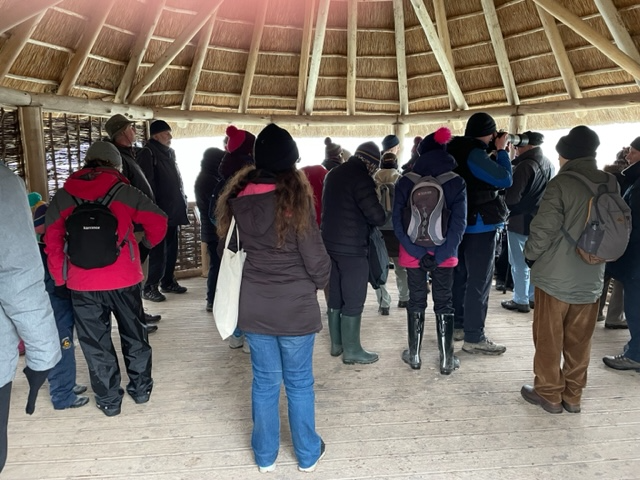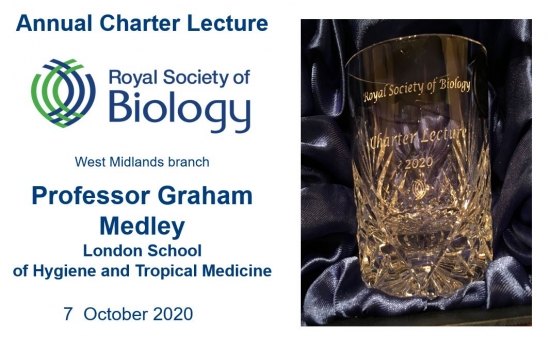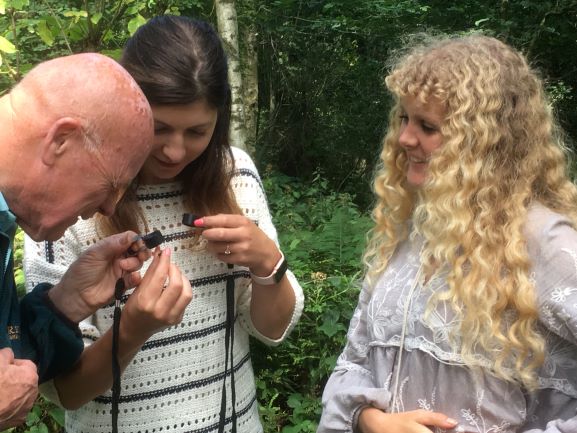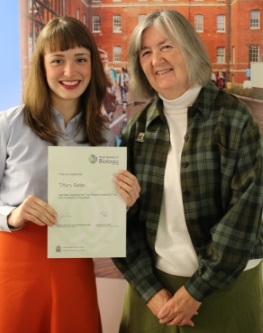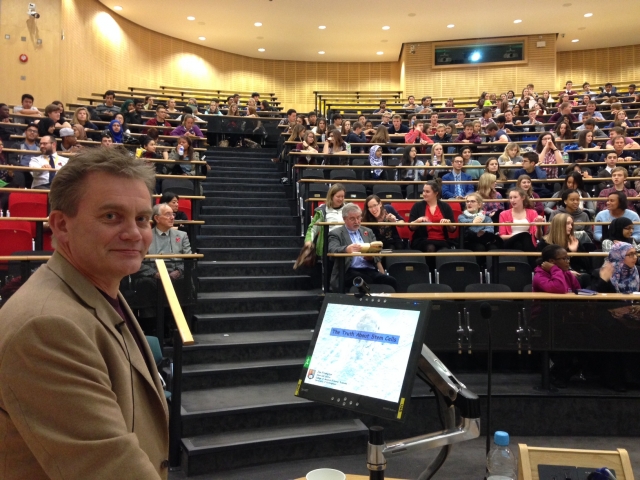Reports
Visit to the WWT Slimbridge Reserve
On the third Saturday in January when the west of England was blanketed in fog, 26 intrepid RSB members and guests met for a guided tour of the Wildfowl and Wetlands Trust at Simbridge. Although several areas of water were frozen and some bird houses out of bounds (to protect against avian flu) our WWT volunteer guide Peter Taylor introduced us to several species, sprinkling his discourse with anecdotes which personalised the birds and highlighted the importance of the application of knowledge supported by enthusiasm.
In 2010, the Great Crane Project was launched to re-introduce these birds: eggs were collected in Germany, hatched in the UK and reared by people disguised in beekeepers outfits to avoid the chicks imprinting on humans. For the first time in more that 400 years cranes are now living and breeding in the wild in Gloucestershire and Somerset. we saw several of the multiple bird species on conservation breeding programmes and learned of many successful re-introductions to native habitats.
Slimbridge is perhaps best known for the large number of Bewick's swans which overwinter there, but their numbers have dwindled by nearly 40% since 1995 and they are now an endangered species. Other birds which also breed in the tundra of Northern Europe are decreasing, such as the Scamp, and the Greenland White Coated Goose which is the fastest declining goose in the UK (both can be seen at Slimbridge).
The bitterly cold, foggy weather and congenial guide served to boost the convivial atmosphere of our first post-covid in-person excursion. A visit to Slimbridge in warmer weather is recommended; explore the acres, see the avian residents of the River Severn wetlands and engage in scheduled activities (see wwwt.org.uk) whilst learning about the vital conservation work for which the reserve has become internationally renowned since it was set up by Sir Peter Scott in 1946.
Dr Caroline Day FRSB
Elephants, Rainbows, Flowers and Bees: Research Driven by Botanic Gardens
As part of the 2023 Darwin Shrewsbury Festival, the West Midlands branch was delighted to welcome Professor Beverley Glover, director of Cambridge University Botanic Gardens and professor at the University of Cambridge, to give this year’s lecture. Professor Glover delivered an enthralling online talk on the vital role of botanic gardens within biological research, demonstrating the deep history and importance of the gardens in understanding not only floral traits, but also wider issues such as diseases and biodiversity.
Looking at pollination, Professor Glover delved into how the traits of a flower directly impact the relationship between the pollinator and plant. Pollination is critical for food production as every third mouthful stems from a pollinated plant, including chocolate! There are many floral traits which affect the likelihood of a plant being pollinated. This talk had a particular focus on iridescence - a trait that is often overlooked. It was highlighted how structural colour could be produced from an otherwise transparent material, through the formation of the equivalent of diffraction gratings in flowers. The relationship between plant development, growth and iridescence was further explored and explained by the formation of ridges in the waterproof coating of cuticles, which can lead to mechanical buckling. The talk concluded with the powerful message that biological research using plants has great potential - making the work being conducted at botanic gardens of paramount importance for our future.
"Research Driven by Botanic Gardens" left participants thoroughly enthused and engaged. The audience expressed their appreciation for the interesting and fascinating lecture, with many acknowledging that their eyes had been opened to the research potential held within botanic gardens. Professor Glover's emphasis on the importance of understanding floral traits, and the relationship between pollinators and plants, highlighted the crucial role studying plants has in scientific research and conservation efforts.
Georgia Wood AMRSB
Darwin Shrewsbury Festival 2022: From Felis to Felix
The West Midlands branch was delighted to once again take part in the Darwin Shrewsbury Festival to celebrate the birthday of Charles Darwin, and was particularly honoured to present this talk, via Zoom, on the anniversary of Darwin's birth on 12th February 1809. The talk ‘From Felis to Felix - The Genetics of Domestic Cats’ was delivered by branch Chair Dr Jill Johnson, senior lecturer of Biomedical Sciences at Aston University.
Jill began by outlining how the popular domestic cat evolved from the European wild cat, suggesting that the Romans initially brought cats to Britain. After explaining some simple genetics terms, Jill discussed the genetics of the many mutations causing variation in appearance such as coat colour and pattern, fur length, eye colour and body structure. Jill described how black/blue/chocolate coat colour could be diluted by the presence of a particular protein to give lighter colours such as grey and light brown. Jill also examined the difference between mackerel and blotched tabby, what causes tortoiseshell and why ginger cats are almost always female to name but a few. She also explained how dark colours on the faces, feet and tails of Siamese arose and the possible causes of the large white patches commonly seen in other coat colours such as black.
Jill concluded by discussing the development of some of the more recent breeds which have become popular though sadly can sometimes be susceptible to various health problems.
Her talk was illustrated throughout by photos of pets taken by members of the Kings Heath Cat Club and it generated much interest reflected by the questions that followed. To conclude the event, Jill’s cat Darwin, a blotched tabby and the branch mascot, made an appearance delighting the audience. A very informative, clearly explained talk for those wanting to learn more about their pet cats, which can be viewed on the RSB YouTube channel.
Lesley Payne MRSB
The Science of Christmas
On a cold and frosty December evening, the holiday season and its festive traditions were analysed as per the scientific process. Dr Kate Ashbrook, senior lecturer in Animal Biology at the University of Worcester, presented the virtual audience with Christmas through a scientific lens.
With seasonal enthusiasm, Dr Ashbrook critically examined some of the well-established ideas around Santa’s busiest night. Who knew Rudolph had a bioluminescent nose?! Or that the four stomachs of Santa’s reindeer had so much to do with their ability to fly!
Our fondness for the Christmas feast with all the trimmings was also scrutinised. Sprout sceptics within the audience were let off the hook, as Dr Ashbrook explained why some of us really can’t stomach this Christmas delicacy.
Even the nature of the Christmas Spirit was put under the microscope, as Dr Ashbrook dissected the MRI evidence to support such a psychological phenomenon, posing questions about how people from various cultures perceive Christmas.
The seasonal merriment delighted the audience of 27, with one attendee describing the event as ‘the perfect way to kick off the Yuletide celebrations.’
Many thanks to Dr Ashbrook for bringing us together virtually to examine the science behind the mysteries of Christmas, and to all the audience for sharing in the festive fun.
Laura Guest AMRSB
Charter Lecture: Spinal Muscular Atrophy - therapies and screening
The West Midlands’ branch was delighted to welcome Professor Philip Young, from the School of Life Sciences at the University of Warwick to give their online 2021 Charter lecture during Biology Week, titled Spinal Muscular Atrophy - therapies & screening. Dr Daniel Franklin and Dr Sue Howarth, West Midlands branch committee members, introduced the speaker, selected questions from the audience and gave formal thanks along with showing the engraved, locally made glass to be delivered to the speaker afterwards.
Professor Young explained the molecular and genetic mechanisms of spinal muscular atrophy, before describing the exciting new therapies to treat what was previously an untreatable disease. Zolgensma, the latest treatment, has spectacular results and represents the first major gene therapy for a neuromuscular disorder. It is available on the NHS and is the most expensive drug ever made. The talk also covered the whole spectrum of topics relevant to the disease by including clinical detail, clinical trial progress and genetic newborn screening programmes and their ethical implications.
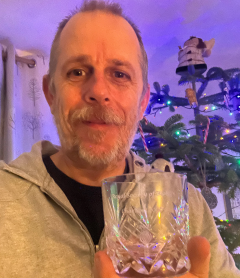
A glowing piece of feedback left by an attendee stated that the event ‘was an amazing lecture about SMA and new therapies. Absolutely worth it.’
You can watch the recording of the talk on the RSB YouTube channel.
Dr Daniel Franklin MRSB
Virtual Quiz - Changes in Biology
Change is a fact of life and all good things must come to an end! On Friday 3rd September 2021 starting at 19:00, the West Midlands branch of the RSB held their 17th and final monthly virtual quiz on Zoom and Kahoot! The quizmaster Dr Jill Johnson and the moderator Dr Patricia Esteban led the event which taught attendees all about the mechanisms of change in biology, with rounds on Migration, Mutation, and Metamorphosis. Participants used all their wits to answer questions on flies, butterflies, eels, and even Franz Kafka! Kudos to our winners:
First place: BlueBee (Laura and Nigel Hibberts)
Second place: CheerfulGnu
Third place: PurpleYeti (Soledad Ricciardi)
Congratulations to all our participants! Follow the RSB West Midlands branch on social media for more information on all of our future events, including a potential a holiday-themed virtual quiz in December!
Dr Jill Johnson MRSB
Virtual Quiz - Biology on the Telly
Who knew so many long-running television shows were based on the biological? On 6th August 2021 starting at 19:00, the West Midlands branch of the RSB held their 16th monthly virtual quiz on Zoom and Kahoot! The quizmaster Dr Jill Johnson and the moderator Ben Glover led the event and posed questions on the more entertaining aspects of biology with this month’s theme of Biology on the Telly, with rounds on forensics, aliens, and medicine. Participants used their biology knowledge and TV know-how to answer questions on television shows new and old, from the UK and abroad. Kudos to our winners:
First place: DecisiveDuck (Jean MacDonald)
Second place: ExcitedLark
Third place: SpaceWildcat (Layla Alexandra)
Congratulations to all our participants! Follow us on social media for more information on the next (and final) monthly West Midlands virtual quiz will be on Friday 3rd September at 19:00 with the theme Changes in Biology.
Dr Jill Johnson MRSB
The Life Beneath Our Feet
22 June 2021
Dr Simon Jeffery, reader in soil ecology at Harper Adams University, took us on a fascinating journey through the miniature universe found in soil. In this online lecture, Dr Jeffery made us think about a world incredibly close to us but sometimes overlooked – what lives below ground.
With eloquence and captivating facts, Dr Jeffery made us think about scale, and how zooming into the soil reveals a great deal about its content and three-dimensional structure. Dr Jeffery then walked us through the outstanding number of species in soil, whose features and behaviours depend on the depth and location of their homes within the important porous structure of soil.
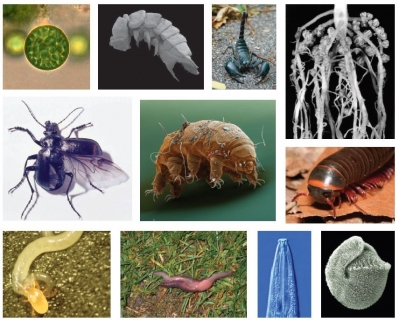
The role that all forms of life and their symbiotic relationships and communication have on the soil’s ecosystem affects agriculture, including crop yields, hence why human manipulation affects the soil’s biology and its dynamic nature. This, together with factors such as climate change, places our soils under threat. Finally, we were reminded that, although we often do not realise, soil provides food, fuel, fibre and medicines and it is non-renewable. As such, soil is a precious resource, perhaps even more than water, and we need to look after it.
The talk was well attended by both members and non-members of the RSB, with a total of more than thirty participants. Dr Jeffery concluded his excellent intervention by answering questions from attendees, who provided brilliant feedback. Our branch committee chair, Dr Jill Johnson MRSB, chaired this Q&A session.
We would like to thank our branch committee vice chair Dr Sue Howarth FRSB for organising this fantastic lecture, Ben Glover for helping with the technical side and, of course, Dr Jeffery for his thought-provoking talk.
You can watch a similar talk delivered by Dr Jeffrey at the DarwIN Shrewsbury Festival this year.
Dr Patricia P. Esteban MRSB
Virtual Quiz - Biology in Birmingham
Which animal escaped from the Birmingham Wildlife Conservation Park? Where was the endoscope invented? Which city in Canada is named after a berry? On Friday 2nd July 2021, the West Midlands branch of the RSB held their 15th monthly virtual quiz on Zoom and Kahoot!
Once again, the quizmaster Dr Jill Johnson and the moderator Ben Glover led the event and provided informative insights on this month’s theme of Biology in Birmingham, focusing on the local flora and fauna as well as important biology-related discoveries in three Birminghams: UK, Alabama and Saskatchewan. Participants were able to answer questions on the fascinating biology associated with these three cities. Kudos to our winners:
First place - ElatedGator (Laura and Nigel Hibberts)
Second place - FunnyKoala
Third place - SnowyShark (Zita Balklava)
"Many thanks for another excellent quiz, just missed the podium!! I found this one really interesting.
Well done!" WMRSB quiz #15 participant
Congratulations to all our participants! Follow us on social media for more information on the next West Midlands virtual quiz on Friday 6th August at 19:00, with the theme Biology on the Telly.
Dr Jill Johnson MRSB
Virtual Quiz - Microbes: Viruses, Bacteria and Fungi
Which virus is the biggest? How do Vampirococcus feast on their prey? What is Quorn actually made from? On Friday 4th June 2021 at 19:00, the West Midlands branch of the RSB held their 14th monthly virtual quiz on Zoom and Kahoot! The quizmaster, Dr Jill Johnson, and the moderator, Ben Glover, led the event and provided informative insights on this month’s theme of Microbes: Viruses, Bacteria and Fungi. Participants were able to answer questions on the delightful biology that can’t be seen with the naked eye. Kudos to our winners:
First place: RoyalSeal (Laura Hibberts)
Second place: AmazonGazelle (Sachi Tengse)
Third place: SocialRabbit (Zita Balklava)
"Many thanks again for another fun quiz, though must admit I didn't seem to know much about microbes!" WMRSB quiz #14 participant
Congratulations to all our participants! Follow us on social media for more information on the next West Midlands virtual quiz will be on Friday 2 July at 7pm with the theme Biology in Birmingham.
Dr Jill Johnson MRSB
Virtual Quiz - Food, Fashion and Forensics
On Friday 7th May 2021 starting at 19:00, the West Midlands branch of the RSB held their 13th monthly virtual quiz on Zoom and Kahoot! The quizmaster Dr Jill Johnson and the moderator Dr Patricia Perez-Esteban led the event and provided informative insights on this month’s theme of Food, Fashion and Forensics. Participants used all their wits to answer three rounds of questions on the many ways in which biology impacts on our everyday lives. Kudos to our winners:
First place: MagicBear
Second place: FearlessPanda (Lesley Payne)
Third place: EpicUnicorn (Laura & Nigel Hibberts)
"Many thanks for all your hard work in producing another fun quiz. I did much better this time, at least for the first two rounds!" WMRSB quiz #13 participant
Congratulations to all our participants! Follow us on social media for more information on the next West Midlands branch quiz night on Friday 4th June 2021 with a Microbiology theme – Viruses, Bacteria and Fungi!
Dr Jill Johnson MRSB
Virtual Quiz - Milestones in Biology
On Friday 9th April 2021 starting at 19:00, the West Midlands branch of the RSB held their 12th monthly virtual quiz on Zoom and Kahoot – a full year of virtual quizzes! The quizmaster Dr Jill Johnson and the moderator Ben Glover led the event and once again provided enlightening commentary on this month’s celebratory theme of Milestones in Biology – Botany, Zoology and Medicine. Participants used all their wits to answer three rounds of questions on important events in biology, both over evolutionary time and in terms of human discoveries. Kudos to our winners:
1st place: EpicWildcat
2nd place: FunnyJaguar
3rd place: GentleFerret (Laura and Nigel Hibberts)
"Many thanks for another fun quiz. Great to hear that you will be sharing your expertise with the other branches. Look forward to the next one."
- WMRSB quiz #12 participant
Congratulations to all our participants! Follow the branch on social media for more information on the next West Midlands branch quiz night – Friday 7th May 2021 with the theme Food, Forensics and Fashion!
Dr Jill Johnson MRSB
Virtual Quiz - What makes us sick: Genes, Environment and Lifestyle
On 5th March 2021 starting at 19:00, the West Midlands branch of the RSB held their eleventh monthly virtual quiz on Zoom and Kahoot! The quizmaster Dr Jill Johnson and the moderator Ben Glover led the event and provided informative insights on this month’s medical theme of What makes us sick: Genetics, Environment and Lifestyle. Participants used all their wits to answer three rounds of questions on the various causes of disease. Kudos to our winners:
1st place: BlueTurtle (Olwen Owen)
2nd place: ExpertMeekat
3rd place: InspiredRhino
"Well done! Another excellent quiz. Many thanks for all your hard work, found this one particularly interesting." - WMRSB quiz #11 participant
Congratulations to all our participants! Follow the branch on social media for more information on the next West Midlands branch quiz night on Friday 2nd April 2021 with the theme Milestones in Biology to celebrate one full year of WMRSB virtual quizzes!
Dr Jill Johnson MRSB
DarwIN Shrewsbury Festival: Unnatural Selection
13 February 2021
Each year since 2003, the market town of Shrewsbury, the birthplace of Charles Darwin, holds a festival in his honour. Despite the pandemic, this year’s festival went ahead online, and the West Midlands branch were excited to have Katrina van Grouw, author and illustrator of The Unfeathered Bird and Unnatural Selection, deliver our 2021 Darwin lecture.
Katrina, introduced by branch committee Chair Dr Jill Johnson MRSB, gave an enthusiastic talk about how Darwin’s use of selective breeding as an analogy for natural selection was far more appropriate than even he realised. As well as challenging common misconceptions about the phrase “survival of the fittest”, Katrina disputed the idea that selective breeding is “unnatural”, and distinct from natural selection.
Using insightful examples from her research, and entertaining animations, Katrina pointed out the parallels between the selection pressures exerted by breeders, and those in nature, and how ultimately both captive and wild populations are subject to the same rapid unavoidable evolution. Even Darwin the cat, the West Midlands branch mascot, got a shout out!
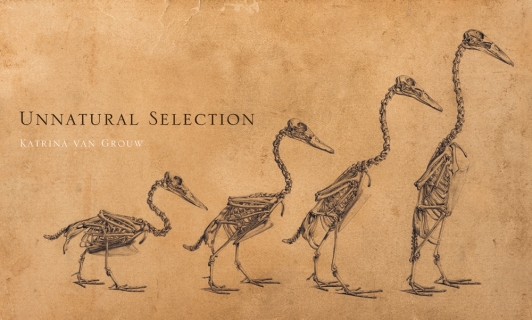
‘Ascent of the Mallard’ by Katrina van Grouw. The title page from Unnatural Selection, depicting the progressive changes in posture to create the Indian Runner Duck from its wild ancestor.
We also learnt about the laborious process Katrina went through to not only produce the stunningly detailed anatomical artwork for her books, but also to reveal the various physical layers of her subjects.
A virtual audience of over 55 attended the lecture and were invited to ask questions afterwards. Branch committee member Dr Daniel Franklin MRSB put forward questions from the audience about Katrina’s illustrations, her thoughts on current issues faced by breeders, and how the scientific research community could learn something about genetics from selective breeders.
Many thanks to branch committee Vice Chair Dr Sue Howarth FRSB for organising this fascinating lecture, and Katrina van Grouw for thoroughly explaining how selective breeding is, in fact, a perfect example of evolution in action.
Laura Guest AMRSB
Virtual quiz - Biology in the Movies: Monsters, Heroes and Bugs
On Friday 5th February 2021 starting at 19:00, the West Midlands branch of the RSB held their tenth monthly virtual quiz on Zoom and Kahoot! The quizmaster Dr Jill Johnson and the moderator Ben Glover once again led the event and gave insights and fun facts (and movie recommendations!) on this month’s cinematic theme of Biology in the Movies: Monsters, Heroes and Bugs. Participants used their knowledge to answer three rounds of questions on how biology features in film. Kudos to our winners:
1st place: Stellar Buffalo
2nd place: Agent Newt
3rd place: Fabulous Deer
Congratulations to all our participants! Follow the branch on social media for more information on the next West Midlands branch quiz night – Friday 5th March 2021 with the theme What Makes Us Sick: Genes, Environment and Lifestyle!
Dr Jill Johnson MRSB
Virtual quiz - Festivities, Food and Fun
On 11th December starting at 19:00, the West Midlands branch of the RSB held their eighth monthly virtual quiz using two digital platforms, Zoom and Kahoot, in the guild up to the festive season. The quizmaster Dr Jill Johnson and the moderator Ben Glover led the event and provided fun and informative commentary on this month’s holiday theme categories of Festivities, Fun, and Food. Participants used all their wits to answer three rounds of questions on how we celebrate at the end of the year, with a focus on biology, of course! Kudos to our winners:
1st place: Winged Wallaby
2nd place: FuzzySable
3rd place: Bright Sloth aka Kate Farr
Follow us on social media for more information on the next West Midlands branch quiz night on 8th January 2021 with the theme Birth, Growth, and Regeneration!
Dr Jill Johnson MRSB
Virtual quiz - Barriers, bridges and byways
24 November 2020
On 6th November starting at 19:00, the West Midlands branch of the RSB held their seventh monthly virtual quiz using two digital platforms – Zoom and Kahoot! The quizmaster Dr Jill Johnson and the moderator Ben Glover led the event and provided informative insights on this month’s theme categories of Barriers, Bridges, and Byways. Participants used all their wits to answer three rounds of questions on how things get around in biology.
Kudos to our winner, Zara!
Follow us on social media for more information on the next West Midlands branch quiz night!
Dr Jill Johnson MRSB
Charter Lecture: The transmission dynamics of COVID-19 in the UK: where are we going?
7 October 2020
The branch was delighted to welcome Professor Graham Medley OBE, from the London School of Hygiene & Tropical Medicine, and member of SAGE, the Scientific Advisory Group for Emergencies, to give their 2020 Charter lecture. The West Midlands has been putting on Charter lectures for many years, but this was our first online lecture.
Dr Daniel Franklin MRSB, branch committee member and former PhD student of Professor Medley, introduced the speaker, selected questions from the audience and gave thanks along with showing the engraved, locally made glass, delivered to the speaker afterwards.
Professor Medley explained how the various groups that fed into Government decision-making for epidemics worked and where modelling fitted into the science behind COVID-19. One memorable phrase was that modelling in a pandemic was important because of uncertainty, but also impossible because of uncertainty. Links between schools, households and work were considered, along with those of hospitals, social care, prisons, gyms, bars and personal care.
Mapped out networks between schools created by children in the same household showed how the virus could move from one end of the country to the other via such networks. The clustered nature of infections was used to show that tracing backwards to find sources is 2-3 times more effective than tracing forwards alone.
The effects of interventions on reducing the ‘R’ number were discussed and a balanced view given of the pros and cons of different interventions. For further information, an earlier article was recommended and the LSHTM website.
The very positive feedback included: “An excellent Charter lecture” and “Professor Medley gave thoughtful and measured responses to the many questions asked”.
We congratulate Professor Medley on his award of an OBE in the recent Queen’s Birthday Honours. The recording of the lecture can be viewed on the RSB YouTube channel.
Dr Sue Howarth FRSB
Meet the Committee
6 October 2020
The Chair of the West Midlands branch committee welcomed everyone and, after a résumé of some RSB information, provided an overview of recent branch events. These included: a talk on blood vessels, a lecture about the Birmingham Institute of Forest Research (BiFoR) and a talk at the Shrewsbury Darwin Festival. When face-to-face events were no longer possible, the branch switched to online events, with virtual quizzes every month. In May, epidemiologist and committee member, Daniel Franklin, gave a talk on COVID-19 via a ‘Twitter Takeover’.
Committee members then introduced themselves; Amelia Lakin talked about the role of Meetings Secretary; Luisa Orsini, Senior Lecturer/Associate Professor in Biosystems and Environmental Change at the University of Birmingham provided clues as a challenge to work out the focus of her research; Ben Glover talked about what he could bring to the committee pre and post A-levels; Jill Johnson, Lecturer and Principal Investigator at Aston University, spoke about her research and many interests; and Sue Howarth recounted her involvement with the International Biology Olympiad, the OUP/RSB biology primers and the RSB School Biology Teacher of the Year award. Overall, we hoped we showed how a range of diverse people, all with a passion for biology, work together as a successful RSB committee.
Plans for future events were shared: the Charter lecture, more quizzes, our AGM and talk on hedgehogs, and, longer-term, a virtual Christmas social, an online lecture for the 2021 Shrewsbury Darwin Festival, and when possible, visits to the forest run by BiFoR and to the Slimbridge Wetlands Centre. The branch also hopes to hold their postponed Pioneers of Biology event, a talk about Maurice Wilkins. Participants were invited to ask questions and to suggest other events. A warm invitation was extended to attend our AGM and to consider joining the committee.
You can download the slides that were used in the talk.
Dr Sue Howarth FRSB
Virtual quiz - Faster, higher and stronger
2 October 2020
The West Midlands branch held their sixth monthly virtual quiz using two digital platforms – Zoom and Kahoot! Quiz master Dr Jill Johnson and moderator Ben Glover led the event and provided informative insights. Participants used all their wits to answer three rounds of questions on the exceptional in biology in the categories Faster, Higher, and Stronger, in honour of the Summer Olympics that didn’t happen in 2020. Kudos to our winners:
Digital winners, using Kahoot-generated animal nicknames:
1st place – Amiable Kitten
2nd place – Classy Dragon
3rd place – Charming Bobcat
It’s worth mentioning that the winner of the October quiz – Amiable Kitten, also known as Leticia Gross – is only nine years old! Kids and adults are welcome to take part in our family-friendly quizzes.
Follow us on social media for more information on the next West Midlands branch quiz night!
Dr Jill Johnson MRSB
Virtual quiz - Eat, drink and breathe
4 September 2020
This month’s quiz was effectively advertised over social media and drew in around 30 participants. The quiz master Dr Jill Johnson and the moderator Ben Glover led the event and provided informative insights as participants used all their wits to answer three rounds of questions on how living things Eat, Drink, and Breathe. Kudos to our winners:
Digital winners – using Kahoot-generated animal nicknames:
1st place – Silver Puffin
2nd place – Diplomat Sphinx
3rd place – Amazing Emu
Follow us on social media for more information on the next West Midlands branch quiz night!
Dr Jill Johnson MRSB
Family Quiz - Furry, scaly and slimy
3 July 2020
On Friday 3rd July starting at 17:00, the West Midlands branch of the RSB held their third monthly virtual quiz using two digital platforms – Zoom and Kahoot! Following on from the success of the previous two monthly quizzes, this event drew in around 30 participants of all ages. The quiz master Dr Jill Johnson once again led the event with the support of other members of the West Midlands branch committee, and provided fantastic commentary as participants answered three rounds of family-friendly questions on Furry, Scaly, and Slimy living things. Kudos to our winners:
Digital winners – using Kahoot!
1st place - Lucky Dingo/Shoutah Hagoo, aged 17
2nd place - Aquatic Raven/Adam Bomb, aged 75
3rd place - Silver Leopard/Jonathan and Edie Aspinall, aged 9 and 6
Follow the branch social media for more information on the next West Midlands branch quiz night!
“Well done, another excellent and informative quiz. Many thanks for all your hard work in preparing it.”
- WMRSB virtual quiz participant, 3rd July 2020
Dr Jill Johnson MRSB
Virtual Quiz - Small, big and tiny
5 June 2020
On Friday 5th June starting at 19:00, the West Midlands branch of the RSB held their second monthly virtual quiz. The event was advertised over social media and drew in around 30 participants. The quiz master Dr Jill Johnson once again successfully led the event and provided fascinating insights as participants used all their wits to answer three rounds of questions on all things Small, Big, and Tiny in the natural world. Kudos to our winners:
Digital winners – using Kahoot!
1st place: Amy
2nd place: Cuby
3rd place: Matt W
Analogue winners – handwritten answers
1st place: Hagoo
2nd place: Darren and Yasmin (tied)
3rd place: Rosemary
The next West Midlands branch quiz night will be on Friday 3rd July 2020 with questions for kids on the theme Furry, Scaly, and Slimy!
“Congratulations on another great quiz!”
- WMRSB virtual quiz participant, 5th June 2020
Dr Jill Johnson MRSB
Virtual Quiz - People, places and plants
8 May 2020
On Friday 8th May starting at 19:00, the West Midlands branch of the RSB held their first ever virtual quiz using two digital platforms – Zoom and Kahoot!
The event was effectively advertised over social media and drew in around 20 participants. The quiz master, and branch committee member Dr Jill Johnson led the event and provided colourful commentary as participants used all their wits to answer three rounds of questions on People, Places, and Plants. Kudos to our analogue winner Lesley Payne and our digital winner Amy Norman (playing as BraveHamster). Follow the branch social media and web page for more information on the next West Midlands branch quiz night!
“I just wanted to say congratulations on Friday’s excellent quiz! I really enjoyed it.”
- WMRSB virtual quiz participant
Dr Jill Johnson MRSB
Darwin Festival
15 February 2020
Since 2007, the West Midlands branch has been involved with the Darwin Festival that takes place every year in Shrewsbury, the birthplace of Charles Darwin. The date for this festival is always chosen to be the week around Darwin’s birthday on 12th February 1809.
This year, we were delighted to have Emma Sherlock, Chair of the Earthworm Society of Britain and Senior Curator in Charge for the Free-living and Parasitic worm collections at the Natural History Museum, come from London to give our 2020 Darwin lecture. Emma gave a lively talk about working in the NHM, and particularly about the challenges of collecting and looking after her soft-bodied specimens. We heard about the variety of worms and earthworms, in the UK and further afield, as well as about those collected by Darwin himself that Emma helps to curate.This well-illustrated talk was accompanied by various live specimens, which generated a lot of interest.
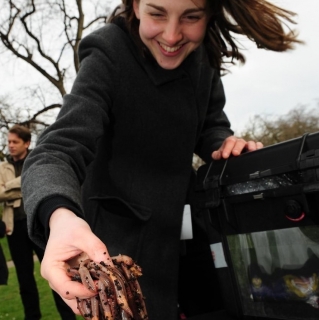
Despite an exceedingly wet day, we had a good turnout and an interested audience who asked many questions. We thank the University Centre, Guildhall, Shrewsbury, established by Shropshire Council and the University of Chester in 2014, which provided the venue free of charge as part of the Darwin Festival and also Shrewsbury BID, organisers of the Darwin Festival.
The branch hopes to continue providing a Darwin-themed lecture for the festival, so look out for our 2021 Darwin Festival talk.
Dr Sue Howarth FRSB
Blood Vessel Formation and its Application to Treating Disease
14 January 2020
The first West Midlands branch talk of the year was held at Tudor Grange Academy, Solihull and was given by Dr Angel Armesilla, a Reader in Molecular Pharmacology at the University of Wolverhampton. He presented his research into how blood vessel formation can be regulated to treat some diseases.
Dr Armesilla began the talk by briefly explaining the process of angiogenesis, where new capillaries are formed from existing blood vessels, and how this occurs in embryos, placenta growth and wound healing. Dr Armesilla then linked this to pathological angiogenesis and how diseases can arise as the result of excessive or insufficient angiogenesis.
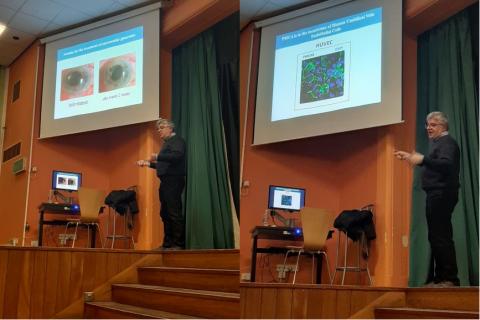
With the aid of easily accessible diagrams, Dr Armesilla proceeded to describe how a tumour promotes angiogenesis, so that it receives a constant blood supply for its survival. This was followed by an informative insight into Dr Armesilla’s research on different areas of the tumour angiogenesis process and how drugs such as Avastin can prevent new capillary formation and therefore starve the tumour.
Concluding the talk, Dr Armesilla discussed some of the setbacks in using angiogenesis-targeting drugs to treat cancer, detailing some side effects, such as the toxic effect that ATA has on endothelial cells.
The fascinating talk was followed by numerous insightful questions from the captivated audience, who afterwards made it clear how much they had all enjoyed their evenings.
Ben Glover
Christmas Social 2019
10 December 2019
On a wild and windy night in December, members and non-members met in Birmingham City University, Edgbaston campus, to enjoy an evening of short talks, a raffle, seasonal refreshments and a biological quiz. Our thanks go to Jill Johnson, committee member, for organising the quiz, which was as tough as last year’s and to Ashok Patel, one of our two West Midland’s RSB Ambassadors for organising the venue, catering, student talks and a good portion of the audience.
The series of short talks started with Ashok explaining how best to offset the consequences of over indulging in calories over Christmas (with some evidence suggesting an 8 hour feeding, 16 hour fasting daily regime is beneficial). This was followed by BCU students Ilana Schajer and Salma Abdirahman talking, respectively, about their time in a Jerusalem laboratory via a summer internship to research bacteriophages and issues surrounding cancer and its early detection.
After watching a short video where Markus Eichhorn discussed the different types of Christmas tree, Sue gave the final talk about the unexpected visitors that can arrive with your Christmas tree, such as aphids, spiders, mites, bark beetles and even preying mantises.
The branch hopes to hold their 3rd annual Christmas social sometime in December 2020, so do join us if you can. Members are very welcome to offer a short, 5-10 minute, seasonal talk.
Dr Sue Howarth FRSB
Synapse for Brownies and Girl Guides
12-13 October 2019
Synapse was a two-day workshop event held at Aston University on 12 and 13 October as part of the West Midlands Branch Biology Week activities.
Participants included 25 Brownies and Girl Guides (aged 9-15) from a number of units throughout Birmingham, who had the opportunity to experience biology and immunology through hands-on activities and direct engagement with scientists currently working in the Department of Biosciences at Aston University.
Activities included a number of hands-on activities in the lab space at Aston University: they investigated the different types of bacteria that live on our skin, looked at their own cells under a microscope, extracted DNA, and observed live cells in culture.
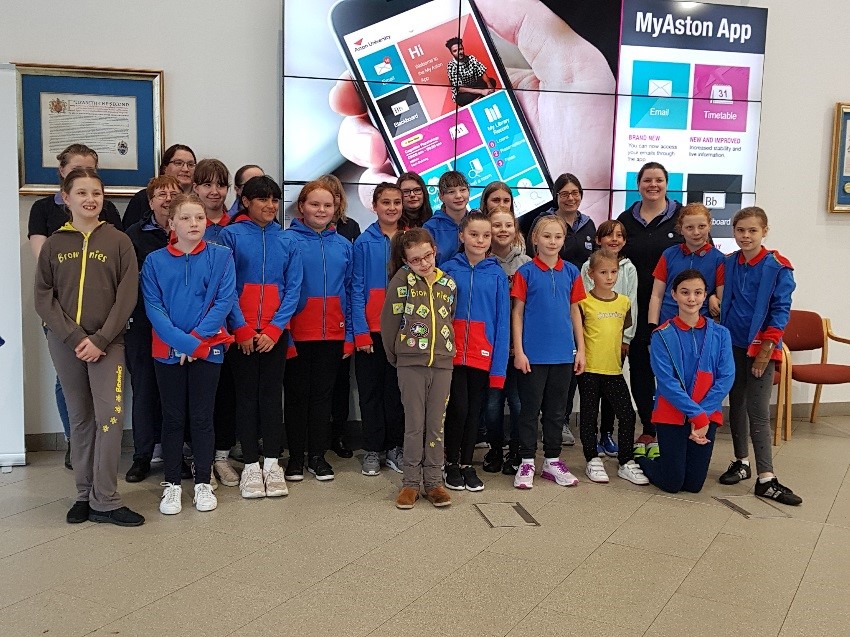
The girls also learned about important events in biology, such as diapedesis (the process by which immune cells leave the blood), and about different techniques used in biology labs such as immunofluorescent staining and flow cytometry.
Participants also completed two art projects using French knitting. This involved building a vascular bed with arteries, capillaries, veins, and immune cells, which was mounted on a large canvas for display. They also made models of antibodies using lolly sticks, sticky pads, and felt balls to learn about the function of antibodies, how viruses adapt to circumvent the immune system, and how vaccines work.
Many thanks to the partners that made this event happen: Aston University, the British Society for Immunology, and the Royal Society of Biology.
Dr Jill Johnson MRSB
From Great While Sharks to a Big Blue Whale: why I love museums
8 October 2019
This year’s RSB West Midlands Charter Lecture was delivered by Dr Natalie Cooper, a specialist in comparative biology and a staff scientist at the Natural History Museum in London.
Throughout the lecture, Dr Cooper discussed her field work experience and what it’s like working at the museum. The highly interactive talk started with a visual journey through ongoing projects at the Natural History Museum and the immense variety of plant and animal life stored in the Museum’s archive.
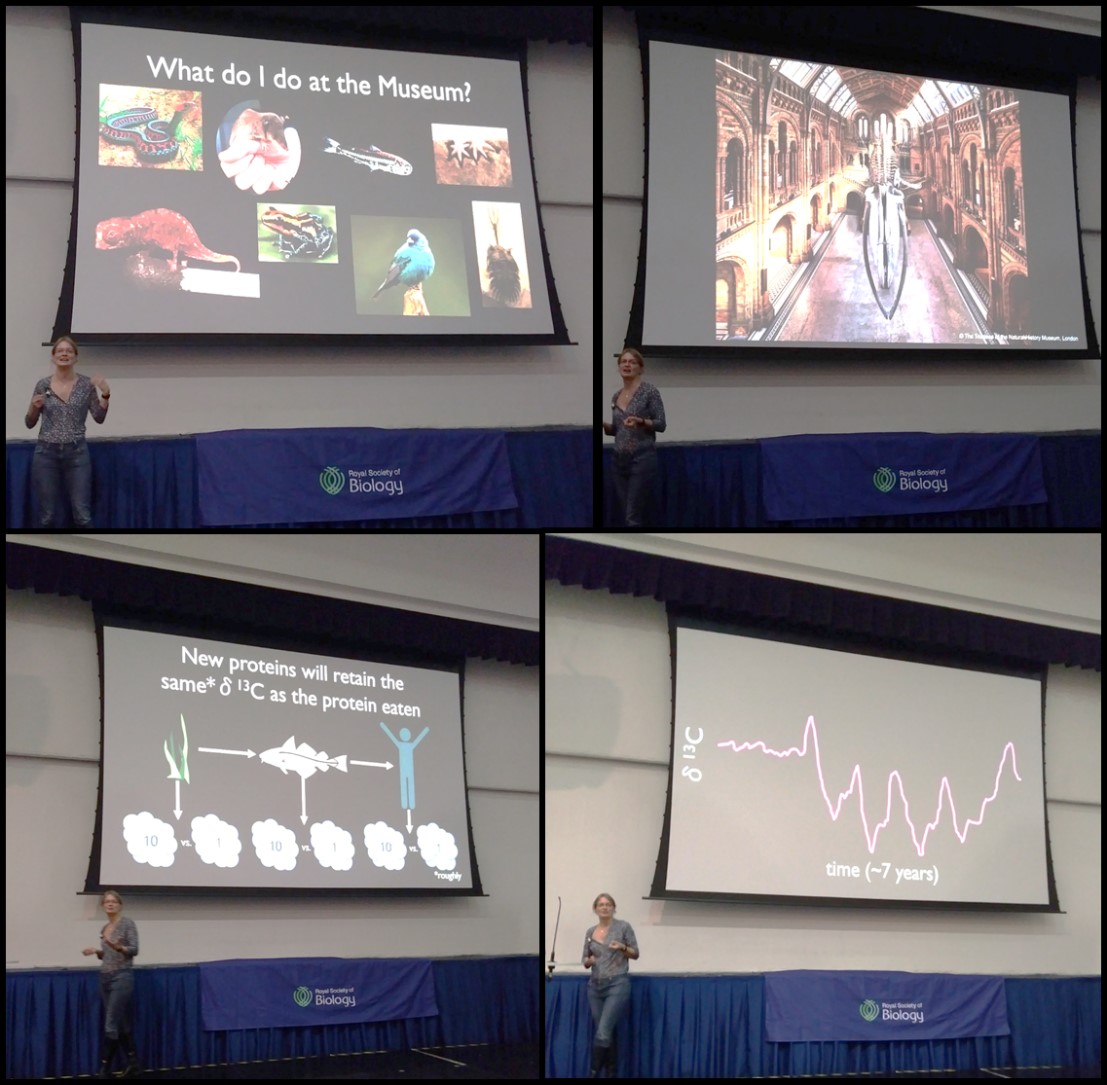
The rest of the talk focused on Dr Cooper’s work with Hope the Whale, and how she and her team retrieved a not-quite-fully grown blue whale skeleton from storage, cleaned it, and mounted it in Hintze Hall to replace Dippy, the iconic Diplodocus cast, which is currently on tour.
The talk concluded on a more scientific note, with Dr Cooper discussing her isotope analysis of whale baleen, which can be used to track the migration patterns of whales over a long period of time.
Dr Cooper’s lecture was followed by a lively question and answer period touching on whale biology, the fascinating wildlife of Madagascar, and interesting careers in biology.
Dr Jill Johnson MRSB
An Inordinate Fondness for Beetles
15 August 2019
Members and non-members came from across the West Midlands and further afield to take part in the all-day workshop on beetle identification held at Bishops Wood Study Centre, near Stourport-on-Severn in Worcestershire.
Katy Potts, @KatyPottsEnto, from the Natural History Museum, London, ran the sessions, with support from Holly Dillon, BioLinks Assistant. We used excellent binocular microscopes provided by the Centre and trays of coleopteran specimens from NHM. Some of the specimens were over 100 years old and had to be handled carefully.
While the focus of the day was on enabling identification of UK beetles to family level, some of the more exotic species proved popular, including the giraffe-necked beetles. After an illustrated introduction to the main families, there was time to practice and build up confidence in identification; in some cases, identifying to genus and species level.
A useful tip to distinguish beetles from true bugs is to look at how the wing cases are folded; wing cases of true bugs form a ‘Y’ or an ‘X’ shape (apart from aphids and scale insects) whereas those of beetles form a ‘T’ shape.
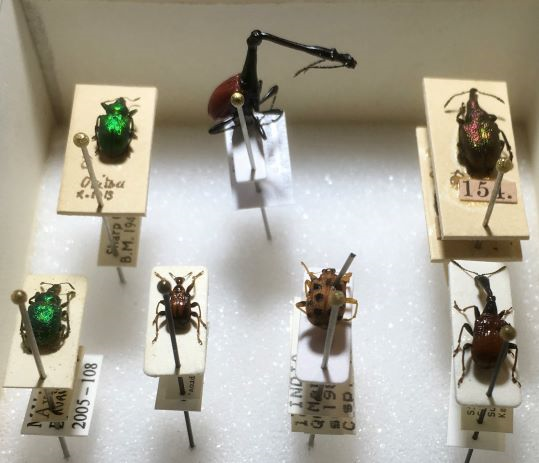
A sunny day meant that participants enjoyed lunch outside by the pond and took part in a rewarding post-prandial beetle hunt; many different beetles were found, particularly under logs.
Our thanks go to the Field Studies Council BioLinks project which subsidised this workshop. This project aims to bring together those with skills in biological identification and new volunteers to improve the quality of invertebrate species data being submitted to national biodiversity datasets, and to develop individuals as more highly skilled biodiversity volunteers. By the time we left the workshop, all of us were certainly more highly skilled in beetle identification.
The branch hopes to offer another BioLinks workshop next year, on a different group of invertebrates.
Dr Sue Howarth FRSB
Birmingham Wildlife Conservation Park Visit
27 April 2019
The bleak weather did not deter our members from journeying to Birmingham Wildlife Conservation Park for a lecture on Wildlife conservation – actions and outcomes and trip round the park.
The Park, which originally opened as Birmingham Zoo in 1964 kept a range of species (e.g. lions, kangaroos, camels, gibbbons), but closed less than a decade later, only to re-open in 1974 as Birmingham Nature Centre.
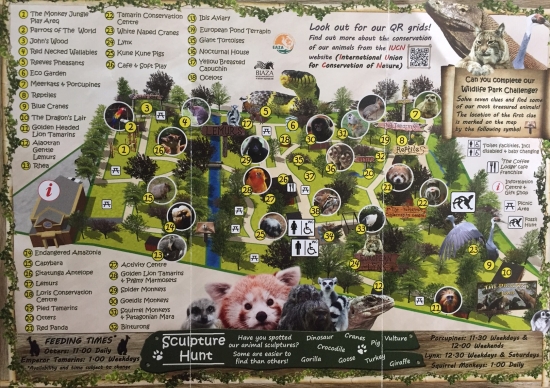
The Centre focussed initially on native and domestic species and started moving into exotic species about 20 years ago, and was conferred its current name in 2014 to better reflect its activities.
The Park now houses about 80 different animal species – it is one of seven centres which is home to a Komodo dragon – and is part of the EPN (European Breeding Programme).

Nearly half of the Park’s species are mammals, over one-third are reptiles (although many are not visible to the public), more than 10% are birds and amphibians and arachnids feature amongst the creatures being carefully bred (to maintain genetic diversity) and nurtured. The ultimate aim of the EPN is to be able to successfully release animals into the wild.
Originally the lecture was to be followed by a self-guided tour of the Park, but our lecturer Gareth very kindly gave us a fascinating tour with insider information on the life of animals and their keepers.
A memorable, but chilly visit. When the weather is warm and dry we’d recommend considering an expedition to the Park.
Dr Caroline Day FRSB
Darwin’s Nemesis – the interesting case of Alfred Russel Wallace
16 February 2019
The West Midlands branch was pleased to support this year’s Shrewsbury Darwin Festival. The annual festival honours Charles Darwin’s birthday, 12th February 1809, and his birthplace, The Mount House, Shrewsbury. The lovely Abbeygate Hall, within a medieval building, once part of Shrewsbury Abbey and now headquarters of the Shropshire Wildlife Trust, made a great venue. There was just enough room to fit everyone in, including a few people on the waiting list.
Our invited speaker, James Williams, lecturer in education at the University of Sussex, gave a well-illustrated talk about the interesting case of Alfred Russel Wallace. Wallace’s life and career were described, and the timing of Wallace’s notes about the origin of species that were sent to Darwin was clarified – essential in knowing how much Darwin used Wallace’s ideas. The talk was supplemented with original photographs and research that provided new information.
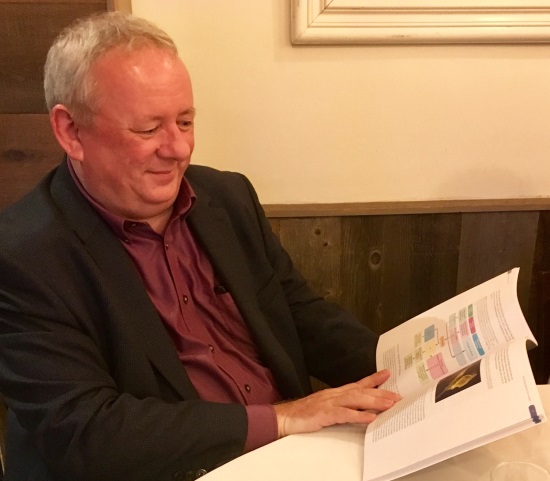
The audience responded with many thoughtful questions at the end, particularly regarding the spelling of Alfred Wallace’s middle name. During the talk, it was suggested, from first hand examination of the family prayer book*, that a second ‘l’ had been erased at some point. This fuelled speculation about possible reasons that continued to be debated until we had to vacate the hall.
A member of the audience wrote, following the event: “We thoroughly enjoyed the lecture on Alfred Russel Wallace… It was most interesting to find out so much more and the whole afternoon went very well with the receptive audience who became very involved”.
The branch looks forward to holding another Darwin lecture for the Shrewsbury Festival 2020.
*Note: you can read James Williams’ article on Alfred Russel Wallace in The Biologist (2013), Vol 60 (5), 22-25. This has a photograph of the prayer book inscription.
Dr Sue Howarth CBiol FRSB
From Birds to Cockroaches - Inaugural Christmas Social
11 December 2018
An entertaining talk, seasonal refreshments and a quiz all helped to make a success of our first Christmas social for members and guests. The event was held in the studio of the gold-coloured, landmark Hive building in Worcester, Europe’s only joint university and community library.
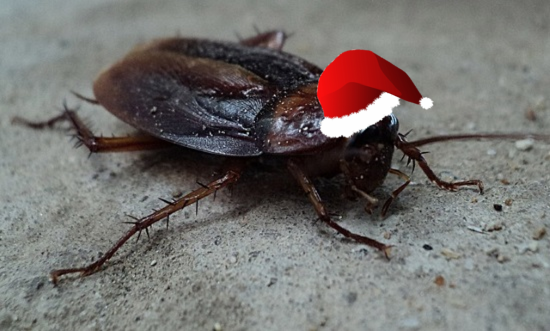
Dr Kate Durrant, from the University of Nottingham, talked about alternative tactics under sexual selection, using a range of animals as examples (some with Christmas hats on, especially for our event!). Kate has worked in Australia and the USA, and her list of publications is extensive. She has also been featured in National Geographic, so we were privileged to hear her talk about her research.
Mince pies, gingerbread and wine went down well with the audience following the talk, and the quiz, organised by Dr Jill Johnson, Aston University and a West Midlands committee member, was taken very seriously, with a close race to the finish.
There are plans afoot already to hold a 2019 Christmas social event, so keep an eye on the West Midlands’ events page.
Dr Sue Howarth CBiol FRSB
Annual Charter Lecture
9 October 2018
The Charter Lecture is an annual event that has been carried out by the West Midlands branch since 2009. The event coincides with Biology Week, and aims to support an open dialogue on cutting edge-science between members of the general public and researchers, with a special focus on engaging young people with an interest in the biological sciences.
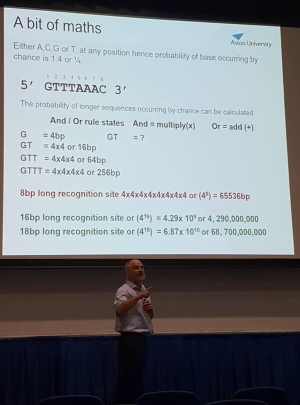 There was an excellent turnout at this year’s lecture, with attendees from local secondary schools, universities, and the wider West Midlands community.
There was an excellent turnout at this year’s lecture, with attendees from local secondary schools, universities, and the wider West Midlands community.
This year’s West Midlands branch Charter Lecture was entitled Genome editing: small change and the mammoth problem, delivered by Dr David Nagel, an expert on the molecular biology techniques that can be used to alter the genetic sequence of live cells.
This engaging talk covered the advances made in the early days of genome editing, the various successes and failures that have happened since that time, including recent clinical applications of the techniques, and what is needed to generate important scientific advancements in this field in the future.
Dr Nagel provided a clear and easy to follow explanation of the maths that explain how these techniques work, and the relative strengths and weaknesses of currently available genome editing methods.
After the talk, the speaker engaged in a lively discussion with the audience that covered aspects of scientific rigour and the ethics associated with genome editing. Dr Nagel said he was thoroughly impressed with the breadth of the discussion and the diversity of the questions.
This highly stimulating evening came to a conclusion with a dialogue on where this field of research may take us in future…will we someday see woolly mammoths wandering the Arctic tundra? Is this something we should even attempt to do?
Dr Jill Johnson MRSB
Apple Orchard Visit
6 October 2018
Distance and uncertain weather did not put people off from attending our visit to Fruitfields Orchard during Biology Week. As well as locals and groups from Birmingham, we had folk from Australia and Anglesey join us for what turned out to be a most informative, interesting and enjoyable event.
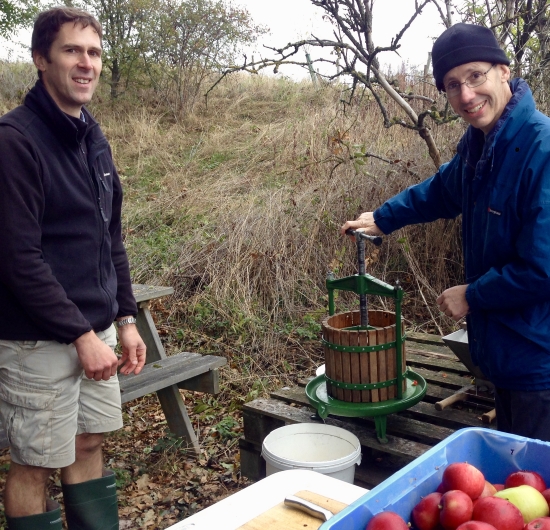 Extracts from some feedback are below:
Extracts from some feedback are below:
“This was a lovely relaxed Saturday afternoon visit. From the slopes of the orchard we had lovely views across the autumn countryside as we learnt about growing apples for juice making. The very freshly squeezed Red Devil juice which we sampled before heading home was delicious and most of us took a bottle or two away with us, as well as apples sneaked (with permission!) into our pockets and the odd jar of honey from Greg’s hives.”
“…Greg and his family were great guides, revealing the history of their enterprise, showing us around the orchards, identifying the characteristics of the apples and allowing us to taste and sample the products.”
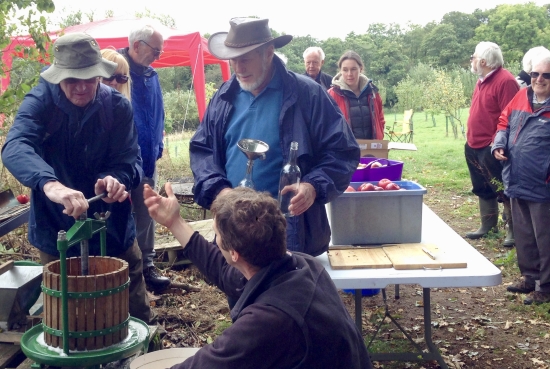
“It was very interesting to hear the ideas behind the planting and see the additional activities with honey & willow. The juicing and tasting gave us the chance to see how the project was focused and realise how this ecologically balanced approach was beneficial in so many ways. We also enjoyed the fruits of the enterprise and the cake and biscuits cooked by the children.”
Dr Sue Howarth FRSB
Apiary Visit
28 July 2018
Members of the North East Worcestershire Beekeepers Association and members of the Society’s West Midlands branch and guests joined approximately half a million honeybees at the Jinney Ring Craft Centre, Hanbury, Worcestershire.
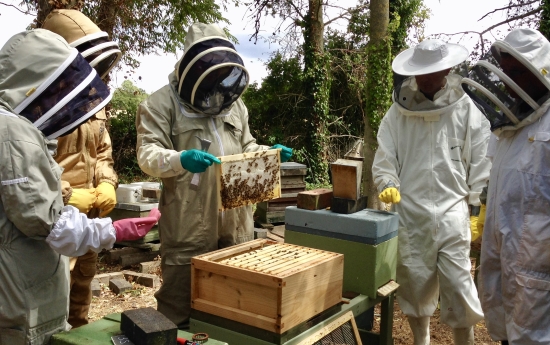
A tremendous amount was learned about Apis mellifera and most of us took the opportunity to handle frames of bees. Tentative at first, everyone gained hugely in confidence and nobody was stung. Comments from the group were very positive, including:
“I had a great time and it was very educational, learning about how the bees stored honey and capped the honeycombs. I found the different techniques the beekeepers used, for example, controlling the queen’s movement so there is only honey in certain parts of the hive, to be ingenious! Watching a bee emerging from its comb was amazing too, truly a unique experience.“
“…It was what we can only describe as a wonderful experience. I still cannot quite believe how interesting and amazing I found it, and I do hope the beekeepers did not mind the barrage of questions we posed to them.”
“…I have been toying with the idea of keeping bees for a number of years and Saturday’s experience has now spurred me on, and I have already watched a number of beekeeping tutorials, and hope to be ready to purchase my first nucleus of bees in the spring.”
Dr Sue Howarth FRSB
The Giant Wombat of Worcester
7 July 2018
On a Saturday in July, the West Midlands branch committee was pleased to host a dual location bioarchaeology event. Starting in Worcester Museum and Art Gallery, Rob Hedge – known as the ‘incurable archaeologist’ and the Finds & Public Archaeologist for Worcestershire Archive and Archaeology Service – told us about some amazing specimens, including the ‘giant wombat’ of Worcester and the Strensham mammoth.
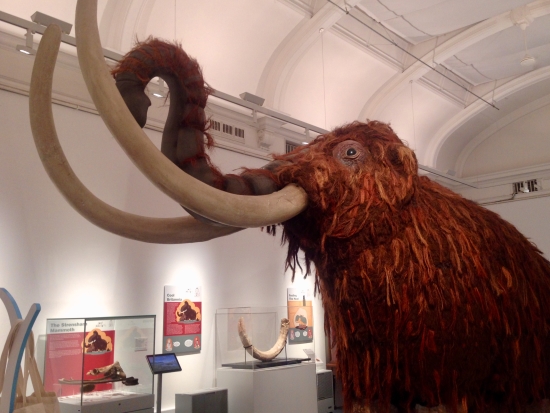
His talk included thought-provoking ethical implications of the conditions under which some of the fossils had been collected, particularly those brought back from Australia. Following a pleasant lunch in the museum café, we took a short walk to The Hive, Europe’s only joint community and university library.
Inside this striking gold-coloured building, Rob explained the museum’s summer ‘Ice Age’ and ‘Lost Landscapes’ exhibitions, which not only featured an irresistible walk-on reproduction of the first geological map of the country, but also more fossils and artefacts, including some dug up within months of the exhibition opening by University of Worcester archaeology students.
Overall, the exhibition showcased over half a million years of prehistory, all with a Worcestershire connection, stretching until the end of the last Ice Age, 12,000 years ago. The project was funded through grants from the Heritage Lottery Fund and Arts Council England along with funding from the Council for British Archaeology West Midlands, and the West Midlands Museum Development Fund. With many thanks to Rob, who gave both talks and came with us for the walk, despite a painful knee injury.
Dr Sue Howarth FRSB
Butterfly Farm Family Event
14 April 2018
This year the West Midlands branch decided to take the families in our region to the butterfly farm situated in the lovely town of Stratford-upon-Avon.
Butterflies prefer a very warm and humid, tropical environment. This was evident the moment we stepped into the enclosure, when the humidity had the whole group panting and sweating. Once we acclimatised, we noticed the beauty of the enclosure and the multitude of butterflies flying overhead.
We were privileged to have been given the tour by the farm’s own managing director Richard Lamb MRSB. Richard gave us a very insightful and energetic tour, was very enthusiastic about his butterflies and had a real knowledge in the field. Eventually we reached the mini beast metropolis, an area filled with insects, reptiles and amphibians from all over the world. The younger members and a few brave parents were given the opportunity to handle giant snail and huge millipedes.
Later, the group was stunned to see hundreds of leaf cutter ants crawling overhead, carrying leaves and foliage back to the nest, a network of ropes suspended from the ceiling providing passages for them to return to their main colony. We said our goodbyes to our tour guide and thanked him for what was a great tour of the butterfly farm.
Elisha Zadok AMRSB
Spider workshop
26 May 2018
Beautiful Shropshire was the destination for those booked into the joint RSB West Midlands/Field Studies Council (FSC) Discovering Spiders workshop on Saturday 26th May.
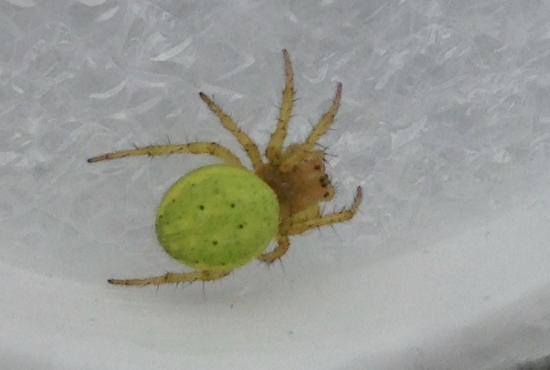
Dr Charlie Bell, FSC BioLinks project officer in the West Midlands, ably coordinated the workshop hosted by FSC BioLinks Project and FSC Preston Montford. Nigel Cane-Honeysett, a founding member of the Shropshire Spider Group and the British Arachnological Society’s Vice County Recorder for Shropshire and West Midlands Regional Organiser, delivered most of the sessions with expertise throughout the day.
After a warm welcome, we enjoyed a comprehensive introduction, focusing mainly on some of the 670 different spiders found in the UK. A demonstration and discussion on field identification was followed by a session making ‘spi-pots’ so that everyone had their own to use and to take away for future use. We found that these worked really well, enabling spiders to be caught and immobilised for identification, without harming the spider.
Participants were also given the choice of an FSC guide to harvestmen of the British Isles or a guide to house and garden spiders to keep.
An enjoyable lunch was worked off by some fieldwork, involving much use of the spi-pots, vibrating electric toothbrushes to entice spiders out of hiding places, the FSC spider guide and support from Charlie and Nigel. Back indoors, microscopic examination of some of the living finds created much interest, especially seeing the magnified spiders moving on the screen. After a short interval for cake and admiration of the pond, the day finished with information about recording spiders. It was interesting to learn that none are too common to be recorded.
It was a great day overall as can be seen from some of the comments from participants below:
"We thoroughly enjoyed the whole day. We learnt a lot, appreciated the expert information and enjoyed the company of the other RSB members and guests on the course. We've enjoyed spotting and trying to identify our garden spiders since - takes some time to get through the garden chores now!"
And
"I would just like to let you know what a great event this was. I enjoyed every single second of the day. It was great to be with a group of spider lovers who didn’t think I was a bit weird because of my love of the eight-legged beasties. It made me feel like kid again, I remembered all the fabulous days I had bug hunting when I was a child. Even the weather was kind to us."
Extra notes:
- FSC BioLinks is an FSC project that started in 2018 and is funded by a National Lottery grant of £1.23 million. It aims to increase the number of people with skills in biological recording and identification and so increase the quality of invertebrate species data being submitted to the national biodiversity datasets.
- How to make a spi-pot: YouTube video
- Recording spiders: British Arachnological Society
Sue Howarth CBiol FRSB
Darwin – Man, Myth or Icon?
17 February 2018
To support the annual Shrewsbury Darwin Festival, celebrating Darwin's birthday, the branch organised a lecture in the historic Abbeygate Hall, headquarters of the Shropshire Wildlife Trust. Professor Fern Elsdon-Baker, director of the Centre for Science, Knowledge and Belief in Society and principal investigator for the Science and Religion: Exploring the Spectrum project at Newman University, Birmingham, gave a fact-filled talk on some of the changing historical and cultural views about Darwin.
It was intriguing to hear about the many historically inaccurate ideas that have appeared in newspapers, and made their way onto mugs and t-shirts.
The audience appreciated the idea that questioning Darwinism can sometimes be seen as an assault on the entire edifice of evolutionary science; an example given was the furore caused by a 2009 cover of New Scientist proclaiming 'Darwin Was Wrong'. Many biologists like to own a copy of The Origin of Species; a useful tip from Professor Elsdon-Baker was to seek a copy of the 6th edition as this has an extra chapter with responses to criticism.
Professor Elsdon-Baker also described some ongoing research in the UK and Canada into attitudes towards evolution. The work seeks to build an understanding of the social and cultural contexts of public perceptions of the relationship between 'science' and 'religion', across all faiths and none. So far, the findings indicate that more people think that it is difficult to reconcile evolutionary science with religion than is actually so; data shows that the two are generally not counter-oppositional. More about this project can be found at www.sciencereligionspectrum.org
One hundred people booked tickets for this lecture; it was good to know so many people were interested in the topic. The raffle in the interval raised nearly £60, which will go towards prizes for this year's West Midlands School Poster competition.
Dr Sue Howarth CBiol FRSB
AGM and insulin lecture
23 November 2017
Cliff Bailey, professor of clinical sciences at Aston University in Birmingham, gave the talk ‘Insulin – Can’t Live Without It’ following our branch AGM. He has won many awards and accolades associated with his field of research and is included among the world’s top 20 diabetes experts.
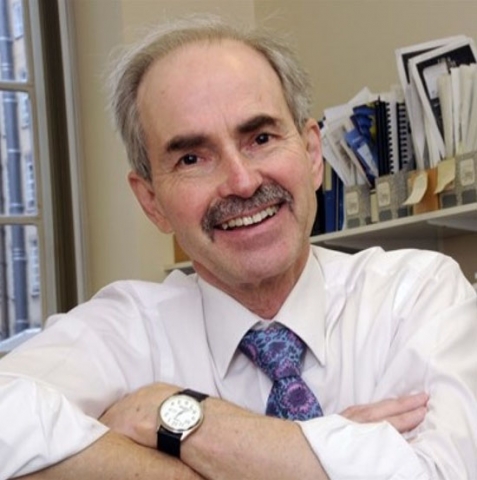
It was clear that the lecture was going to be entertaining as well as educational when the audience’s post-talk buffet was alluded to several times in the context of diabetes.
Fortunately, the cakes on show were small. Cliff’s talk was wide-ranging and covered what insulin is; how it is made, how it works, what happens when it goes wrong (no-one is going to forget the story about the patient who didn’t know that he had a drawing pin in his infected foot, illustrating one of the neuropathic effects of diabetes); a brief history of diabetes and its treatment; insulin therapy now and what may happen next, ‘smart’ insulin pens and ‘flash’ glucose monitoring.
The last, already in use, is a continuous glucose monitoring system that uses an implanted sensor to measure glucose and a transmitter to send data wirelessly to a display device, which shows both graphical and numerical displays.
The audience asked good questions such as whether a person can avoid diabetes by consuming only fatty acids and protein. The answer: no!
Dr Sue Howarth CBiol FRSB
Top Biology Student Award, University of Worcester
2 November 2017
Members of the West Midlands branch committee were invited to send a representative plus a guest to the Institute of Science and the Environment, University of Worcester, Annual Prize-Giving Event. Dr Sue Howarth and Dr Alan Woollhead attended on behalf of the committee and Dr Howarth was delighted to present Tiffany Slater with two prizes: The Royal Society of Biology Top Student Award and The Royal Society of Biology Accredited Top Project Award.
Dr Sue Howarth CBiol FRSB
Brains and Brainwaves
10 October 2017
Whoever would have thought that metronomes and beer cans could be used to represent the synchronicity of brain waves? During Biology Week Professor Paul Furlong, director of Aston Brain Centre, Birmingham did just that. In a video where, much to the surprise of the audience, resting a beam with several differently timed metronomes on two gently rocking beer cans synchronised the beats of the metronomes. This was just one of the many interesting aspects of neural function illustrated in this year's charter lecture.
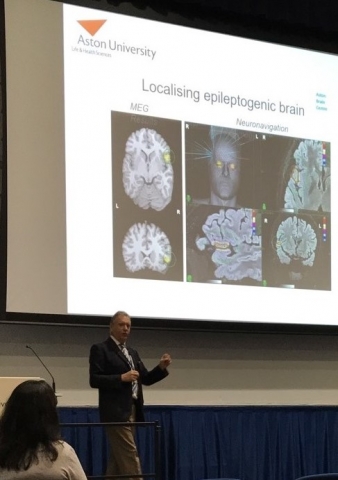
Professor Furlong took the audience on a journey through our brains showing the different rhythms our brains produce whether awake or asleep; these being alpha, theta and beta waves. He showed how brain waves can switch from beta to alpha simply by closing ones' eyes.
The audience was challenged with an optical illusion (that caught almost everyone out) using a chequered board and shadows to demonstrate the manner in which the brain interprets visual stimuli.
The lecture, cleverly entitled 'Brain waves and brain storms', took an unexpected turn as Professor Furlong discussed the effects of epilepsy and regions of the cerebral cortex involved with movement of the limbs and other parts of the body. He showed the audience a video of open brain surgery where the patient was conscious and the brain was stimulated at specific points across the sensory and motor regions of the cortex. This enabled the surgeon to determine regions that must remain intact during the removal of a brain tumour.
Epileptic 'brain storms' can be located noninvasively by a procedure known as MEG (magneto encephalopathy) which records magnetic fields generated by electrical currents in the brain, for example during a seizure MEG can determine the precise location of the disrupted brain tissue. Many thanks to Professor Furlong for the wonderful lecture.
Elisha Zadok
Primary Strands DNA workshop
10 July 2017
This is a regular event held at Aston University on behalf of the West Midlands branch. Thirty Year 6 students from Nosuch Primary School took part in a DNA workshop where we isolated DNA from strawberries using the tried and tested method of washing up liquid, salt and alcohol.
Great fun was had by all and the school integrated the session into their teaching plan for the most recent term's topic. Then as part of the Big Sleuth, an initiative in support of the Birmingham Children's Hospital, students met Ed the X-Ray bear (A sleuth being a group of bears). We hope to run this again in Biology Week.
Dr Steve Russell
Visit to the Lapworth Museum of Geology, the University of Birmingham
29 April 2017
A group of 16 RSB members and guests, some of whom had travelled considerable distances to attend, spent a fascinating afternoon at the Lapworth Museum of Geology at the University of Birmingham. The museum's director gave us an introductory talk, with slides on the history of the museum and its recent refurbishment, then led a tour of the museum, pointing out important or novel features.
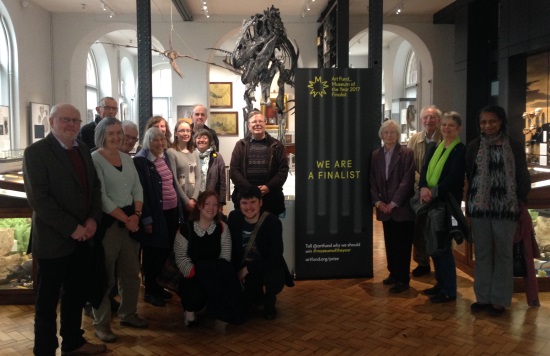
The museum shows fossil specimens displayed according to geological time, together with short videos depicting what the area would have looked like at the time. Some of the very high-quality displays are in the original cabinets but these are now more visitor friendly with portions cut out so children can see them low down. Many fossils are local to the West Midlands and are in excellent condition.
There is also a 'Tree of Life' display showing the classification system using modern zoological specimens. Rock specimens are displayed on a stunning floor-to-ceiling rock wall. The active earth section vividly portrays mountain building, volcanoes, earthquakes and tsunamis in a modern and very visual way. The display of minerals is outstanding in the range and striking in the arrangement which is according to colour.
At the end, the director took us behind-the-scenes to the storage unit to see special items including the type specimen of the trilobite Calymene blumenbachii, also known as the 'Dudley Bug'. We could handle gold, silver and platinum nuggets and were asked to guess which was the most valuable.
The group felt indebted to the director for giving his time so generously and for his unbounded enthusiasm. The museum thoroughly deserves its selection as a finalist in the Art Fund Museum of the Year 2017.
Mrs Norma Broadbridge MBE FRSB
Honeybees and Darwin
11 February 2017
We were pleased to be able to contribute again to the Darwin Festival held every year in Shrewsbury and now organised by the Shropshire Wildlife Trust.
This year our speaker was Dr Alan Woollhead, a former school teacher, head of biology and a beekeeper, who gave an insightful lecture on 'Honeybees: Past, Present and …..What Next?' at the beautiful and historic Cut Visitor Centre in Abbey Foregate, Shrewsbury.
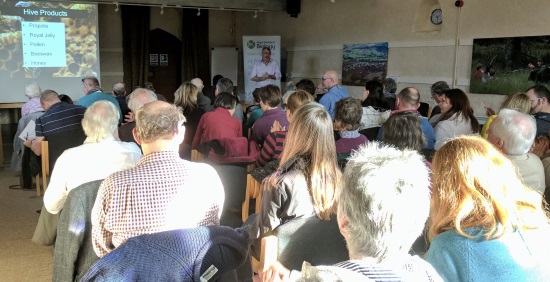
Credit: Janine Taylor
After a brief overview of the evolution of the honeybee, the audience were treated to an well-illustrated account of current beekeeping practices, followed by a discussion of current and potential threats to the health of honeybees and honeybee colonies.
The problems caused by the Varroa destructor mite were explained and the likely arrival of the Asian hornet, Vespa velutina, in the UK was used to suggest how beekeeping might have to change in future. During the talk, the often-overlooked fact that Charles Darwin himself kept honeybees was mentioned; Darwin was particularly intrigued by the evolution of the social behaviour that led to honeybees building hexagonal combs.
Over 50 people, from a wide age range, attended and a number of searching questions were asked at the end, including the impact that Brexit might have on honeybees and beekeeping, and how honeybees sense the percentage of water in their stored honey.
As the talk was given in two halves, the interval was used to hold a raffle. The proceeds went towards the costs of hiring the hall and providing refreshments, and the branch thanks those, including the speaker, who donated raffle prizes, many of which were linked to the theme of bees.
We hope to continue supporting the Darwin Festival again next year.
Dr Sue Howarth CBiol FRSB
DNA masterclass
12 October 2016
For the second year in a row Aston University played host to 60 year 5 students from across Birmingham during Biology Week. The children completed a number of tasks such as isolating DNA from fruit and examining tissue sections under a microscope before having a tour of the campus. They were joined by some of our second year biology students who wanted to gain some experience of working with school children and these students talked about life as a student and what it was like to study biology.
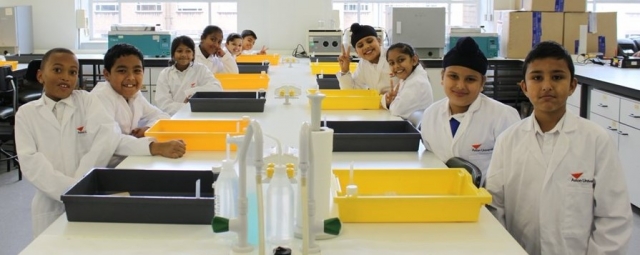 A large percentage of the students involved are part of the pupil premium program and are from some of the poorest parts of Birmingham. They overwhelmingly gave the session the thumbs up and were excited to be dressed as real scientists with their own lab coats. Also several of the schools now want to get involved with our branch events in future.
A large percentage of the students involved are part of the pupil premium program and are from some of the poorest parts of Birmingham. They overwhelmingly gave the session the thumbs up and were excited to be dressed as real scientists with their own lab coats. Also several of the schools now want to get involved with our branch events in future.
One of the teachers comments from Ladypool Primary school in Birmingham said her students were “totally inspired” by the experience. “None of them had ever been inside a university before and some were quite nervous before they arrived. The experiment was a great success and the look on their faces when they saw the DNA extraction was worth the trip itself.”
Dr Steve Russell MRSB
Charter Lecture
11 October 2016
In 1979 the WHO declared that smallpox had been consigned to the pages of history. This virulent disease killed one in three of its victims, with the last death from naturally occurring smallpox in 1977. Professor Gareth Williams, formerly Dean of Medicine at Bristol University captivated an audience of more than 250 people at this year’s charter lecture, ‘Vaccination: Blessing or Curse?’ in which he related the tortuous journey from the introduction of vaccination against smallpox to its eradication.
Professor Williams described the early life of Edward Jenner – his apprenticeship under John Hunter in London, his election to Fellowship of the Royal Society in 1788 for his seminal work on the cuckoo, his work on cowpox inoculation to provide immunity to smallpox, and the establishment hurdles he had to overcome to publish and promote his work on vaccination.
Some medical experts reported that vaccination would turn your child into a cow; others said it would give them TB, syphilis, blood poisoning and madness. The anti-vaccinators also promoted conspiracy theories, claimed vaccination was satanic or against God’s will, argued it was natural population control of the poor, propagated misinformation and enlisted ‘celebrity’ endorsement. Sound familiar?
Jenner had wanted vaccination to be exploited for the good of mankind, so in 1798 he self-funded the publication of his paper; known generally as ‘The Inquiry’ – essentially a DIY guide to vaccination against smallpox. It was an instant success. Such was the influence of ‘The Inquiry’ that vaccination had reached most European frontiers by the start of the 19th century and in 1803 King Carlos IV sponsored the Royal Philanthropic Expedition which sailed around the world providing free vaccination to all Spanish colonies – a substantial contribution to the international eradication of smallpox.
The MMR vaccine has been the most recent focus of the anti-vaccinators and we have seen a resurgence of these diseases. On a positive note, Professor Williams told us that vaccination against guinea worm and polio should see their eradication within the next few years.
Dr Caroline Day FRSB
Primary Strands DNA Workshop
25 May 2016
This is a regular event held at Aston University on behalf of the West Midlands Branch. Forty year five students from Stourport Primary School took part in a DNA workshop, where we isolated DNA from peas and strawberries using the tried and tested method of washing up liquid, salt and alcohol.
Students then examined various tissue samples using microscopes, drawing and labelling what they observed. This was followed by a tour of the research labs and a question and answer session with some of the Aston University undergraduate biology and biomedical science students. Great fun was had by all and the school integrated the session into their teaching plan for last term’s topic.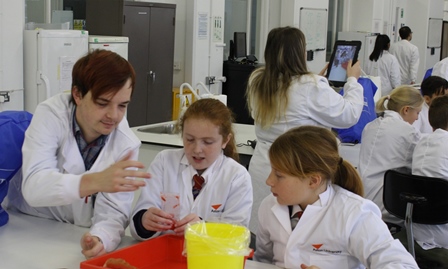
The students then wrote letters of thanks to my team expressing how much they enjoyed the experience. The student quotes included Lizzie: “I loved looking at the samples because it was interesting, fascinating and fun” and Millie: “You and your students gave everyone a lab coat I felt like a real scientist in it.” We hope to run this again in Biology Week 2016.
Dr Steve Russell MRSB
Guided Walk of Ravenshill Woodland Reserve
30 April 2016
Trevor Smart gave a guided walk of Ravenshill Woodland Reserve, Worcester, a 50-acre semi-natural reserve, to a group of 20 members and guests.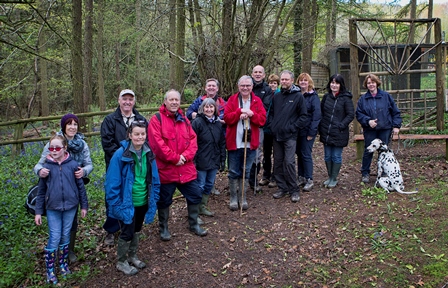
The wood consists of a mixture of broad leaved and coniferous trees. Trevor and Annette Smart own 32 acres, but manage the whole reserve. Volunteer work parties help with management work. They rely on donations to help run this reserve, which is open for the public to enjoy.
Ravenshill is an ancient woodland, which describes a relatively undisturbed native woodland that has been in existence since 1600AD, when records began. We observed a number of Ancient Woodland Indicators (AWIs) such as bluebell, primrose and herb-paris (Paris quadrifolia).
Trevor demonstrated how you can estimate the height of a tree, which aids safe tree felling, and there was a quiz on tree identification by leaf shape for the children.
The woodland is managed for conservation of species, with clear areas for butterflies and dead wood for insects and woodpeckers. Charcoal is also produced on site.
We saw helleborines, ferns, lichens, mosses and ravens during the visit, before heavy rain thwarted our picnic plans.
Ms Debbie Dixon CBiol MRSB
Darwin Festival Lecture
13 February 2016
Professor Mike Bruford from Cardiff University delivered an informative, inspiring and engaging lecture on his research into critically endangered species. Mikes' research has focused on alpacas in South America, black rhinos in South Africa, okapi in the Congo, and peregrines, saker falcons, pandas and primates.
He spoke about conservation of the giant panda, distributed on mountains in Sichuan, Gansu and Shaanxi provinces of West China and a victim of human expansion. There is a captive breeding programme and captive animals are released as cubs into the wild. Pandas are also moved between small reserves to ensure survival.
In 2014, a 4th National Survey showed that there were 1900 individuals in the wild, up from 1600 from the 3rd National Survey.
Mike also spoke about genetics and conservation of the okapi (Okapia johnstoni). Its closest living relative is the giraffe, from which it diverged 11 million years ago. The okapi captive breeding program is well managed but with very limited genetic diversity.
He then explained the use of DNA identification in primate bushmeat from urban markets in Guinea-Bissau and its implications for conservation. Hunting for bushmeat consumption is a major threat to wild populations, and assessing trade at markets provides a commonly used measure of its intensity and impact.
There was time for questions from the enthused audience after the lecture.
Debbie Dixon CBiol MRSB
Biology Week poster competition
21 November 2015
Students throughout the West Midlands area had been working on posters to their tackle some important scientific questions. Schools from across the West Midlands entered the competition with topics covering food production, antibiotic resistance and biofuels.
After a long session of deliberating, Dr Steve Russell MRSB and some of Aston University's second year students, selected the following winners:
Years 7-9 (joint winners)
Gainluca Fudger, Ciaran Gould, Samuel Bradburn, Rosie Richardson, Isabelle Tompkin and Mine Aralikci from Blessed Edward Oldcorne Catholic College
Hannah Shuttleworth from Norton Canes High School
Years 10-11
Sarah Chapman, Roxanne Francombe and Eleanor King-Turner from Warwick School
Years 12-13
Chloe Richards, Jade Howes and Chelsey Wright from Norton Canes High School
Congratulations to the winners who received a selection of top prizes including a certificate, voucher and book.
Dr Steve Russell MRSB
AGM
4 November 2015
The West Midlands branch AGM was held at Coventry University. Afterwards RSB members and their guests enjoyed an interactive talk on forensic DNA profiling, delivered by Dr Elaine Green, Dr Andrew Reid and Dr Adele Heath of Coventry University. The committee’s annual report is available to download. If you would like to see the draft minutes from this year’s AGM, or have any queries, please contact Pamela Speed.
Pamela Speed CBiol MRSB
Primary strands lab experience day
14 October 2015
With funding from the regional grant scheme and some additional money from the local branch, Dr Steve Russell hosted a lab experience day at Aston University during Biology Week for year five students from around the West Midlands.
Over fifty students from five schools examined histology slides, drawing what they observed and labelling them. After lunch they extracted DNA from strawberries using the tried and tested washing up liquid and salt method and took part in a discussion on DNA.
According to feedback from the schools, school staff and children came back "absolutely raving" about the event –" I've had parents giving me very detailed descriptions of what their children have learnt showing how much they have enjoyed themselves," said one teacher.
This has been such a success we are running it again in May 2016 with help again from the society with most of the places already filled.
Dr Steve Russell MRSB
RSB Charter lecture
13 October 2015
Professor Cliff Bailey addressed an audience of over 300 people including scholars, students, schoolchildren and Society members in Aston's Great Hall. His talk highlighted the issue of 'Obesity and diabetes: the paradox between health and wealth'.
An international figure in the field of diabetes, Professor Bailey is known particularly for his involvement in the development of new treatments.
For this year's talk, he considered the underlying mechanisms and inter-relationships responsible for the dual epidemics of obesity and type-2 diabetes. Exploring the health-related consequences of 'diabesity' and the measures being used to combat it, he also explained that when societies become healthier and wealthier they almost always face the avoidable healthcare burden of obesity and diabetes.
Dr Steve Russell MRSB
Visit to Darwin's Garden and talk on Tierra del Fuego, Shrewsbury
14 February 2015
Over 40 Society members and their guests enthusiastically walked in the footsteps of Charles Darwin and saw the garden where his passion for science began. Darwin's Garden itself is set on a steep, muddy hillside and it is in the early stages of cleaning and renovation. Given the number of members present, there were two tour options to choose from, each one benefiting from a Shropshire Wildlife Trust guide.
The challenging route took members down to the River Severn on a muddy riverside towpath leading to the garden itself. The other route visited some of the most important sites in Darwin's early life, ending with a view of the garden from above. Both routes stopped to look at Mount House where Charles spent his childhood, and the history of the Doctor's Gate was revealed. The Shropshire Wildlife Trust conservationists explained the restoration project currently taking place at the site.
The afternoon brought our lecture by Dr Goronwy Wynne FRSB with over eighty people filling the room to listen to a stimulating and entertaining talk on Tierra del Fuego, an archipelago off the southernmost tip of South America. Goronwy set Darwin's visit to Tierra del Fuego in its historical social context, a clash of different civilisations, and his fascinating review of the history set the ground for discussion on the impact modern man had on the native people of this land. The audience was also treated to views of the habitats and wildlife, collected by Goronwy during his own visit to this 'uttermost ends of the earth'.
Following the visit, I am sure there will be much interest on the progress of the restoration of Darwin's Garden.
Laura Cristina Nicolae AMRSB
Student poster competition awards
21 November 2014
Over the last few months, students throughout the West Midlands area have been working on posters addressing some important scientific questions. Topics covered included the usefulness of bees, obesity and ageing. There were over 400 entries from 35 schools and after a long session with Dr James Brown, and some of Aston University's second year students, winners were selected in several age categories.
Winners received prizes including a certificate, a voucher, BioNet subscription to the Society and a book. The students, along with their parents and teachers were then given a tour of the Life and Health Sciences laboratories at Aston University.
Congratulations to everyone who took part and particularly to our winners, pictured below.
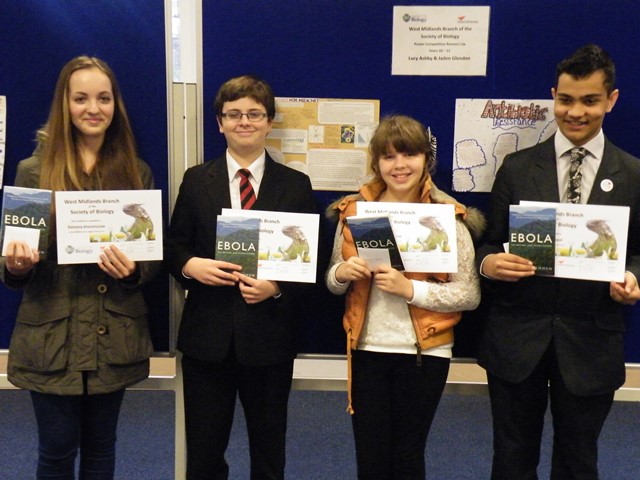
Years 7-9
Winner: Mollie-Anne Bilboe, Plantsbrook School
Runners-up: Ellis Clifford, Alcester Grammar School and Sophie Jones, Alcester Grammar School
Years 10-11
Winner: Dainora Sinceviciute, Moreton School
Runners-up: Lucy Ashby, Shrewsbury High School and Jaden Glendon, Great Barr School
Years 12-13
Winner: Arjun Venu-Gopal, Aston University Engineering Academy
Runners-up: Casey Shaw, Great Barr School and Rachel Heald, Newport Girls High School
Dr Steve Russell MSB
Presentation to student James Kelly
11 November 2014
The West Midlands Committee is delighted that teachers in schools and colleges in the West Midlands continue to enter their students and win medals in the UK Biology Competitions organised by The Society of Biology.
West Midlands continue to enter their students and win medals in the UK Biology Competitions organised by The Society of Biology.
The photograph shows Biology Challenge Gold medal winner James Kelly receiving his book prize from our speaker Professor Jonathan Frampton. Congratulations also go to James's Head of Biology, Mrs Anne Corden, and her colleagues at Old Swinford Hospital School in Stourbridge.
Pamela Speed CBiol MSB
Charter Lecture
11 November 2014
'The truth about stem cells': not a sensationalist tabloid headline, but the title of our Charter lecture this year. Professor Jonathan Frampton (Birmingham University) masterfully debunked the myths and hype surrounding this area of biological endeavour.
The cell as a structure capable of division, differentiation to produce cells with specific functions and with finite lifespans provided the foundation of this carefully crafted presentation. He noted that while the growth of functional whole organs in the laboratory remains the domain of science fiction, the development of specialist cells for implantation is a reality. The exploitation of the pluripotency of embryonic (ESC) and adult (ASC) stem cells was skilfully described with examples of successful stem cell therapies and their particular potential in regenerative medicine.
An attraction of ESC therapy is the minimalisation of histocompatiblity issues in transplant recipients. Similar benefit is derived when ACS are harvested from a donor, cultured and manipulated to develop into the desired cell type and transplanted back into the donor. The most abundant sources of ASC are tissues which are regularly replaced such as intestinal epithelium (replaced every 2-5 days), skin and bone marrow. Indeed 'easy access' to ESC and ASC (eg from umbilical cord blood and milk teeth ligaments respectively) has generated commercial interest in storage of stem cells until needed – at a price. The ultimate insurance policy for your child? The validity of the methodology has yet to be proven.
More than 250 people, including 12 school groups, were treated to an informative and inspirational lecture.
Dr Caroline Day CBiol FSB
Biology Week Lecture: Commercialising Academic Research
15 October 2014
Dr Anna Hine FSB, Reader at Aston University and Commercial Innovator of the Year 2013, was the ideal speaker to challenge our thinking on commercialisation of scientific advances. Anna's team developed novel gene libraries for protein engineering, signing a licensing deal with the company Isogenica in 2010. After a quick romp through the basic science of codon to protein, we were introduced to some of the challenges and breakthroughs in protein engineering for protein libraries using synthetic DNA.
Overcoming degeneracy in the genetic code was a major advance. The discovery that ligase is selective in its action led to optimisation of codon mixes in the synthetic DNA, giving almost total diversity in the protein library ready for screening for desired activity. One important field is the synthesis of antibodies, and we were reminded that antibody treatment is currently the only available treatment for Ebola.
The British academic community still struggles with commercialisation, having a deep-seated preference for funding from the public purse and free open access to any advances. There is more acceptance of commercialisation in the United States, and Anna Hine linked her ease of operating in the commercial arena with her experience as a researcher at Harvard and a year taken out for commercialisation and entrepreneurial training. She explained that a commercial approach brought financial returns for the inventors, the laboratory, the host university and also assured forward research, as the scientists were released from bidding for funding from risk-averse and cash-strapped funding councils. Anna gave her recipe for commercial success as: good science, with the vision to see applications beyond the team's own work; intellectual property awareness and commercial judgement; appropriate industrial contacts; and, finally, a degree of luck.
Pamela Speed CBiol MSB
AGM
15 October 2014
David Urry regional coordinator at the Society, joined discussions at out productive AGM this year. It was good to see some new faces in the room, and we hope that our regional membership will continue to grow.
Like many branches, we have found the traditional committee roles increasingly difficult to fill, so we will trial a new way of working for the year ahead. There will be no traditional chair, and roles and responsibilities will be shared more diversely between our 10 committee members.
Our external communications secretary, Dee Marsh, will act as a facilitator for queries and information passing to and from the committee. Contact us if you would like further information about the 2014/15 committee's structure and way of working. We will also be happy to provide the minutes of this year's AGM on request.
We would like to thank those who are retiring from the committee for thier services to the branch. They are: Ann Vernallis, James Brown, Debbie Dixon, Richard Crombie, Alex Heuer and Dilys Beynon.
We are always open to co-opting additional committee members during the year. The following members were elected to the branch committee: Anna Hine, Dee Marsh, Lesley Payne, Pam Speed, Caroline Day, Norma Broadbridge, Steven Russell, Sue Howarth, Cristina Nicolae and Faryal Ejaz.
Pamela Speed CBiol MSB
Carsington Water Visit
28 June 2014
Carsington Water in Derbyshire is a potable water reservoir, recreational site and nature reserve owned by Severn-Trent Water. Supplied from the River Derwent, this reservoir can supply over 200 million litres of water daily to two water treatment works. Mark Guest, senior biologist with the process optimisation team at Severn-Trent gave us a fascinating insight into the management of algae in drinking water sources, complete with many beautiful images of these diverse organisms.
Mark led us through the stages of water treatment and explained how each one can be differently impacted by the seasonal algal blooms, principally the diatoms in spring (with an ensuing zooplankton bloom), the green algae in midsummer, and finally the cyanobacteria in late summer and early autumn. Computer modelling based on data from the last 11 years is aiding the future management of these complex aspects of water abstraction.
In the afternoon we walked beside Carsington Water, which has a 50-year management plan in place and is important for both wildlife and public recreation. Youngsters pond-dipped with Mark, while the rest of us visited the dam and water take-off points with our host for the day, Deidre Marsh, senior scientific advisor with Severn-Trent and honorary secretary of our branch. Thanks to Deidre for keeping us well fed and watered through the day.
Pamela Speed CBiol MSB
Wild Daffodil Day
22 March 2014
Professor Basil Jarvis FSB guided West Midlands and Western branch members and their guests through this fascinating and varied day at Kempley in Gloucestershire. During a day of history-meets-biology, Basil gave talks on two churches, the 12th Century St Mary's and 19th Century arts-and-crafts movement St Edward's.
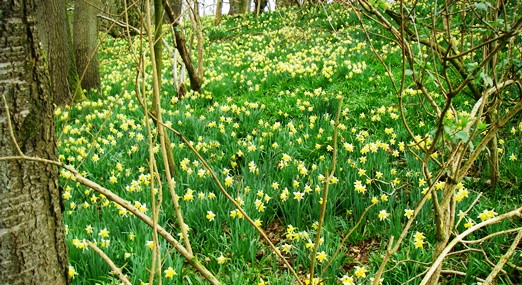
Chris Bligh, environmental campaigner, introduced us to wild daffodils (Narcissus pseudonarcissus) at a Site of Special Scientific Interest and presented an information-packed illustrated lecture in Kempley village hall. Wild daffodils have probably been in these ancient woodland soils since the end of the last ice age 10,000 years ago. Quite different from our garden daffodils, they have a bright yellow trumpet tube that fans out at the tip, paler yellow outer petals the same length as the trumpet and with a slight twist at the base, and flat, bluish grey leaves.
The blooms, transported by rail to cities like Birmingham, provided income for local and itinerant workers during the Victorian period and into this century. The Kempley area is poor agriculturally, and this has helped the wild daffodils' survival as the bulbs, much smaller than modern hybrid varieties, dry out and die if exposed by ploughing or 'topped' by strimming and flailing.
Chris has been involved in maintaining the daffodil habitat and securing lottery funding for the Kempley Tardis project. The day was made perfect by delicious refreshments served in the village hall by Marjorie Jarvis and the ladies of Kempley Churches.
Pamela Speed CBiol MSB
The poison paradox
3 March 2014
Dr Barbara Hall CBiol FSB, managing director of Sureconsult Ltd, now uses her extensive experience in academia and industry to provide scientific consultancy services to the cosmetics industry. Barbara started her lively and well-illustrated talk at Aston University by reminding us of Jane Austen's words: "It is the truth, universally acknowledged, that we live in a toxic world."
Barbara asked us to consider if we live despite the toxins or are sustained by them. Quoting from Paracelsus, the father of toxicology – "the dose makes the poison", Barbara explained the difference between hazard and risk, and how it is the job of the toxicologist to understand the balance between these.
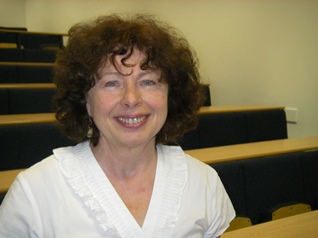 She reminded us of the misleading newspaper articles produced by journalists picking up information and interpreting it without this critical skill, illustrating this point with many examples, including that of the highly toxic liver carcinogen furfural, universally present in fresh-baked bread - you would have to eat 82,600 slices of bread to reach the risk level.
She reminded us of the misleading newspaper articles produced by journalists picking up information and interpreting it without this critical skill, illustrating this point with many examples, including that of the highly toxic liver carcinogen furfural, universally present in fresh-baked bread - you would have to eat 82,600 slices of bread to reach the risk level.
Barbara went on to explain the principles of safe handling of risk, how risk depends on the person being exposed to the toxin and when exposure occurs, and the need to be wary of 'class lumping' (e.g. not all dioxins are toxic). This lecture was not just a talk on toxicology; it was a masterly guided tour through the principles of good scientific thinking.
Pamela Speed CBiol MSB
The Galapagos – 150 Years On Since Darwin's Visit
15 February 2014
Norma Broadbridge MBE FSB presented her lecture on The Galapagos Islands to a packed room of over 80 Society of Biology members, their guests and members of the public. With the help of pictures taken on her visit to the islands, Norma gave us a modern-day biologist's view of the environment, its wildlife and some of the conservation issues being faced there.
Since Darwin's day, improved communications, particularly air transport, have transformed The Galapagos Islands and their unique wildlife. Domestic mammal introduction has been a particular problem. We were shown images of a domestic cat carrying one of the famous iguanas as its prey, and of the huge herds of feral goats which compete for grazing with the iconic giant tortoises.
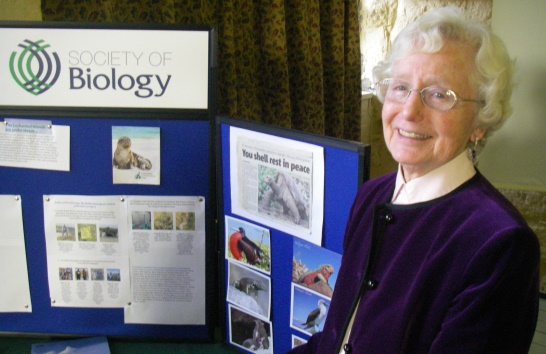 Norma (pictured above) described some of the responses that conservationists are making to such challenges, including careful management of tourism and control measures for introduced species. She left us with an impression of an environment which, although greatly changed from Darwin's visit, is now appreciated and treated with care, and still delights and fascinates visiting naturalists.
Norma (pictured above) described some of the responses that conservationists are making to such challenges, including careful management of tourism and control measures for introduced species. She left us with an impression of an environment which, although greatly changed from Darwin's visit, is now appreciated and treated with care, and still delights and fascinates visiting naturalists.
Pamela Speed CBiol MSB
Alfred Russell Wallace 100 Years On – Is Man Just Another Animal?
12 November 2013
Professor Steve Jones, University College London, engaged and challenged our audience of three hundred sixth form students and their teachers, members and guests in his lecture at Birmingham University.
Professor Jones began by looking at Wallace the man, contrasting Wallace's spiritualism with Darwin's atheism. He went on to deal with the special and remarkable turn taken by human evolution, compared with other primates.
The 1000 Genome Project has compared humans with chimpanzees, our nearest relatives. Our species can be viewed as 'the primate that did not evolve', showing less genetic diversity than chimpanzees, despite chimpanzees staying within Africa and human beings colonising most of the globe.
Physically, humans can be seen as diminished chimpanzees. A single mutation has reduced keratin formation in hair follicles. The human sarcomeric myosin gene has made our muscles puny. Our teeth are smaller, and we have lost the ability to live on raw food, but cooking (dating from pre-human ancestors) enables us to survive with one hour's daily eating, compared with a chimpanzee's eleven hours. Our sexual structures are diminished, and serve cultural purposes as much as reproductive.
Brain development has become supreme; a resting adult human uses 25% of their energy supply for brain maintenance, a baby 50%. Mental and spiritual (cultural) evolution have replaced traditional genetic evolution, with a need to use cultural markers instead of genetic markers to trace our development for nearly all human traits.
Professor Jones outlined the usefulness of study of human language, which evolves at a regular rate, allowing dating. This is described in Professor Jones', The Language of the Genes.
Pamela Speed CBiol MSB
School Poster Competition 2013
26 October 2013
The judging team was led by Dr Sue Howarth, senior lecturer science education, Institute of Education at the University of Worcester. Fellow judges included science teachers in training: Harry Bricknell, Laura Cowley, Mathew Langan, Lauren McAtamney, Geoff Purvis and James Swaffield.
Congratulations to all the winners! View some of the winning posters. 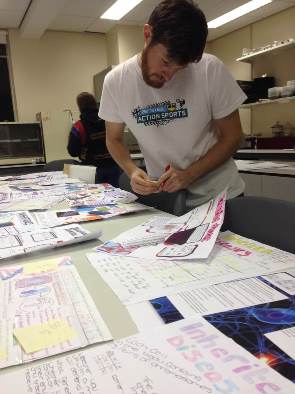
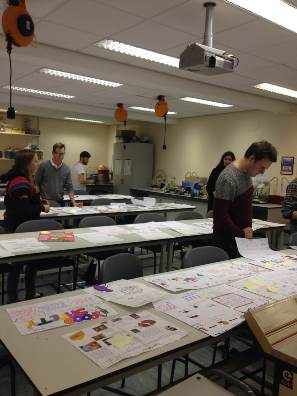
Y7-9: food safety or food webs
1st - Keara Stevens and Casey Barley, Bartley Green School, Birmingham (Food Webs). Teachers: Eleanor Adams, Chris Parry and Rebecca Stags.
2nd - Matthew Chau, Y8, Chesterton Community Sports College, Newcastle under Lyme, Staffs (Food Webs).
3rd - Leah Hopwood, Chesterton Community Sports College, Newcastle under Lyme, Staffs (Food Webs).
Y10-11: inherited diseases
1st - Anna Sweetman, Hereford Cathedral School. (Overall winner with Understanding Inherited Diseases). Teacher: Elena Segelini-Bower
2nd - Lydia Wootton, Chesterton Community Sports College, Newcastle under Lyme, Staffs (Inheritance).
Y10-11: biofuels
1st - Ryan Hibberd, Lawrence Sheriff School, Rugby (Biofuels). Teacher: Usha Dheer.
2nd - Mark Hansford, Lawrence Sheriff School, Rugby (Biofuels - A Renewable Resource). Teacher: Usha Dheer
Y12-13: succession or useful microbes or diseases of the nervous system
1st - Henry Vowles, aged 16, Hereford Cathedral School. (Overall runner-up for Sewage Microbes).
Judges’ comments on the 2013 posters
- An impressive number of posters (81) were submitted to the competition
- Interesting presentation ideas included opening ‘books’ and lifting flaps revealing information
- Some posters had great content but poor presentation; other posters had eye-catching presentation but limited content; the best had both
- Some posters relied on a lot of ‘cut n’ paste’ from the internet; posters were more interesting when content was written by pupils themselves
- It would be nice to see entries from more schools and also more from Y12-13
Pamela Speed CBiol MSB
Dr Christopher U M Smith Memorial Lecture
16 October 2013
Dr Chris Smith FSB was a much loved and inspirational scientist who brought enthusiasm, vision and warmth to his many years of service on the West Midlands branch committee. We were delighted that his widow Jenny and his brother John were able to join over 120 Society of Biology members, friends and former colleagues at Aston University for this memorial lecture.
The event was held jointly with the British Neuroscience Society, represented by Dr Rhein Parry of Aston. Our guest speaker, Professor Eef Horgervost of Loughborough University, presented a scholarly and engaging lecture titled, 'Reducing dementia risk through lifestyle changes: when to do what?'
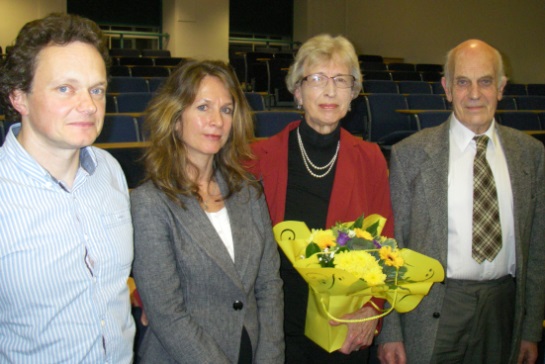
Professor Horgervorst explained that many headline-grabbing interventions, such as oestrogen- replacement therapy and eating tofu, have positive effects in younger people, but can be harmful for over-60s.
The evidence shows that maintaining muscle mass is important; three twenty minute resistance band workouts a week and five thirty minute aerobic exercise sessions are a good guideline. Sudoku and stretch yoga might be good for other things, but for dementia prevention cycling and dancing are better.
Optimise your weight and make lifestyle changes by middle age. Look after your teeth (having fewer than ten teeth doubles the risk of dementia) and keep eating the pulses, oily fish, whole grains, nuts and fresh fruit and vegetables. Ensure a good intake of foods rich in folate and vitamin B12. Reduce your exposure to air pollution and keep well-hydrated.
The big message emerging from the research is, in Professor Horgervorst's words, 'You already know what to do! The guidelines are the same as for heart disease prevention, with an emphasis on aerobic exercise, a good balanced diet and healthy relaxation.'
Pamela Speed CBiol MSB
Society of Biology Top Biology Student Award, University of Worcester
20 November 2013
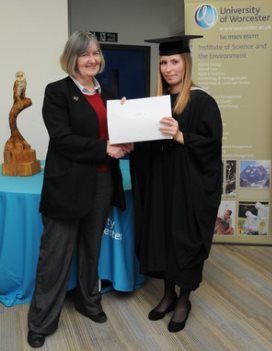
Laura Wells was presented with the Society of Biology prize for the best academic performance amongst biological sciences final year students at the University of Worcester. Laura completed her 1st class degree last summer and is now training to teach biology.
Laura is picture (right) being presented the prize by West Midlands committee member Dr Sue Howarth FSB.
Dr Sue Howarth FSB
Bodenham arboretum
15 June 2013
Our annual family day proved popular as ever. Dave Turner led us on an entertaining arboretum walk; highlights included the laburnum tunnel and a stunning display of azaleas. Dr Steve Reynolds, plant scientist and former ADAS plant disease consultant, introduced us to some tree diseases in the field. Steve is well-known for his public 'What's Up Doc?' Plant Clinics around the country, and his hugely informative, illustrated talk engaged us with tree diseases, diagnosis and treatment, and national trends in disease patterns. The detective trail passes via entomology, then mycology and bacteriology, then virology, and if there is still no answer 'it must be physiological!'
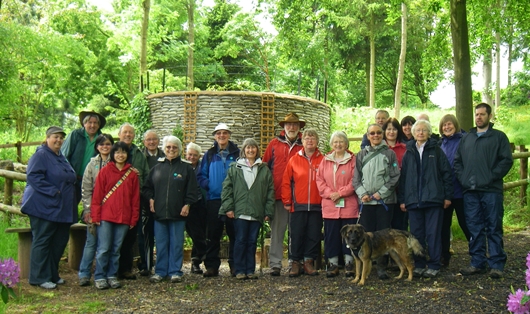
Lavish mulching is transforming the harmless saprophytic coral spot fungus into a parasite on currant bushes. Globalisation has made about 10 problematic tree diseases endemic in the UK in the last ten years, including sudden oak death caused by Phytophthora ramorum, where the pathogen is broadening its secondary host range. WD40 is a successful alternative to soap sprays for killing aphids. Steve updated us on ash dieback (Chalara fraxinea fungus), the unheeded warnings to DEFRA in 2009 to halt genetically homogeneous imports from Holland and Denmark, the ecological importance of our 80 million UK ash trees, and the recent research which suggests that genetic heterogeneity in our established native ashes will eventually ensure our stocks.
Sadly, David Binnian, the founder of Bodenham, passed away a month before our visit; his legacy of this of this lovely arboretum continues to be in the stewardship of the Binnian family and their many friends.
Pamela Speed CBiol MSB
Cannock Sewage Works
10 June 2013
Following a warm welcome from Deirdre Marsh (Severn Trent's senior adviser on Public Health and Standards and committee member) the group split up to visit Cannock Sewage Works. One half were given an insight into the microbiology of the activated sludge process with a fascinating presentation from Severn Trent Water biologist Ian Gray.
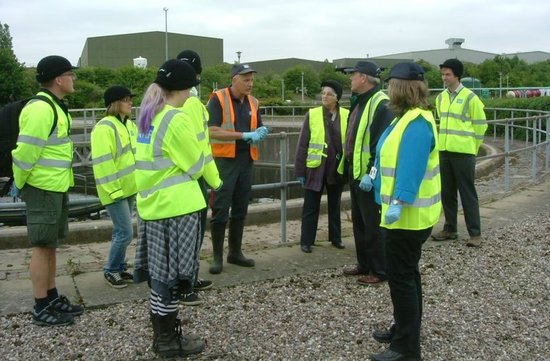
The other half donned hard hats, yellow high visibility jackets and protective gloves for a tour of the treatment works. Our excellent guide, experienced site operator Tom Ward, was really enthusiastic and knowledgeable, explaining how raw sewage was collected from the surrounding areas and treated on site before the cleaned water was discharged into the waterways.
It was an excellent day in which members learnt a great deal, particularly about the unsuitable items that customers flushed into the sewers and the impact this has on Severn Trent and the sewage treatment process. Thanks to Severn Trent for their kind hospitality.
Lesley Payne CBiol MSB
Darwin Festival
16 February 2013
The medieval town of Shrewsbury in Shropshire, Charles Darwin's birth place, holds a Darwin Festival to celebrate his life and our branch was pleased to sponsor a lecture as part of the festival.
Larry Barham, professor of archaeology at the University of Liverpool, is an expert on palaeoanthropology and has been working in Zambia for nearly 20 years with a particular interest in the co-evolution of language, creativity and technology. The lecture entitled Did Tools Make Us Human? offered an archaeologist's view that technology shaped us as a species.
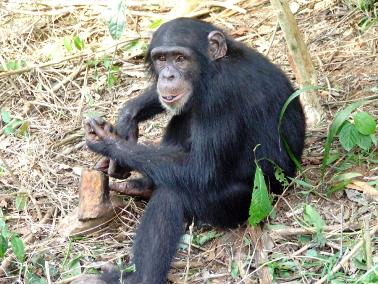
Photo © Dr Susana Carvalho
Larry began by posing the question 'what makes us human?' He proceeded to define technology and discussed its evolution from the earliest stone tools found 2.6 million years ago. Using fossil evidence he explained how humans increased in dexterity and demonstrated the skill of knapping to produce sharp tools. (Apparently humans are better at knapping than chimps!) These were later subjected to hafting which involved the addition of a handle to increase power and leverage. Larry showed how brain size and structure had developed, indicating that language and tool-making networks co-evolved, thus enabling social learning and innovation.
There was a great deal of interaction with an enthused and engaged audience who had the opportunity to handle a range of related fossils and who may never look at a knife and fork (or chopsticks) in the same way again!
Lesley Payne CBiol MSB
Dr Anna Hine FSB wins prestigious 'Commercial Innovator of the Year' award
26 March 2013
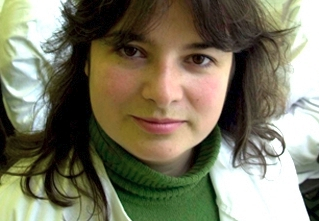 Dr Anna Hine FSB, senior lecturer at the University of Aston in Birmingham, won the BBSRC's award for her development of molecular technologies for protein engineering in the biotechnology and pharmaceutical industries.
Dr Anna Hine FSB, senior lecturer at the University of Aston in Birmingham, won the BBSRC's award for her development of molecular technologies for protein engineering in the biotechnology and pharmaceutical industries.
Commercial Innovator of the Year recognizes the efforts of BBSRC-funded scientists to take their work beyond the lab and deliver social and economic advantages. Dr Hine and her team's research produced technologies for creating high quality gene libraries for use by businesses in the biotechnology and pharmaceutical industries involved in antibody, protein and peptide engineering.
Stratford Butterfly Farm
15th February 2013
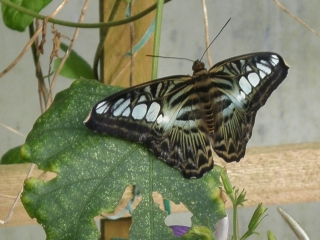
On a sunny Friday in spring members and their guests visited the Butterfly Farm at Stratford-on-Avon Warwickshire. When entering the main area it was noticeably warmer than outside. There were butterflies of all sizes and colours, from all parts of the globe, flying about an area featuring a pond and much lush vegetation. We were free to wander through and interact with these exotic creatures.
Our excellent guide showed us unusual examples of the various stages in the life cycle of a butterfly, ranging from an enormous caterpillar to hundreds of pupae, explaining how they were managed in the different areas. In addition to the butterflies we saw the other insects kept at the Farm including preying mantis and a colony of leaf-cutter ants. Finally we saw their collection of arachnids: giant tarantulas and florescent scorpions!
Following a fascinating visit to the Butterfly Farm several of the group enjoyed lunch at the Academy Restaurant at Stratford College.
Professor Bruce Hood
20 November 2012
An audience of 300 sixth form students, their teachers and members were captivated by Professor Bruce Hood at our annual charter lecture.
of 300 sixth form students, their teachers and members were captivated by Professor Bruce Hood at our annual charter lecture.
Bruce Hood is professor of developmental psychology in society at the University of Bristol and director of the Bristol Cognitive Development Centre, specialising in developmental cognitive neuroscience. In 2011 he delivered the prestigious Royal Institution Christmas Lectures Meet Your Brain, which were broadcast on the BBC to over 4 million viewers. Bruce has also written two books, Supersense (2009) about the natural origins of supernatural beliefs and The Self Illusion (2012) about the fallacy that we are coherent, integrated individuals but rather a constructed narrative largely influenced by those around us. He is well known for his ideas that humans are not rational creatures and this innate irrationality leads to religion and superstition.
Professor Hood delivered an entertaining, interactive and thought-provoking lecture entitled The Self Illusion: How our brain creates our reality. He explored the belief that we are an independent, coherent self - an individual inside our head who thinks, watches, wonders, dreams, and makes plans for the future. This sense of our self may seem incredibly real but a wealth of recent scientific evidence reveals that it is not what it seems–it is all an illusion.
There was time for questions from the delighted and enthused audience after the lecture, followed by presentation of prizes to some lucky winners by Norma Broadbridge, former chair of the British Biology Olympiad.
Lesley Payne CBiol MSB




